2025 GUIDE
Informative articles to help you navigate life from choosing Medical Providers to selecting Home Improvement Companies and all the services in between!
HOW-TO...
Choose A Plumber
Plumbing problems tend to show up at the most inconvenient times — whether it’s a clogged toilet, a leaky pipe, or a malfunctioning water heater. These situations often require immediate action, and making a rushed decision can lead to further damage and higher repair costs.
While some minor plumbing issues can be managed with a plunger or a quick DIY fix, others demand the expertise of a trained professional. Broken pipes, persistent clogs, and water heater failures can result in significant damage if not handled correctly. When your own efforts don’t solve the problem, it’s time to call a licensed plumber.
A qualified plumber brings more than just tools — they provide peace of mind. They can quickly identify the root of the issue, make the appropriate repairs, and even detect early warning signs that could prevent future problems. Having a trusted plumber on call ensures that your home or workplace remains safe, sanitary, and functional.
Here are several tips to help you choose the right plumber:
Start Before a Crisis
The worst time to begin your search is during an
emergency. When water is flooding your bathroom or your heating system fails, you’re more likely to make a hasty choice, potentially ending up with an overpriced or inexperienced contractor. Take the time to find a reputable plumber before disaster strikes, so you’re prepared when it does.
Ask for Personal Recommendations
Reach out to people you trust — family, friends, neighbors, or coworkers. Personal referrals are one of the most reliable ways to find quality service providers. Be sure to focus on plumbers who work in your immediate area, as many professionals charge extra for traveling outside their usual service zone.
Check Local Listings and Online Reviews
Browse local newspapers or community publications for advertisements. These often include useful information about years of experience, areas of specialization, and business hours. Online platforms can also help, but approach reviews with discernment. Look for consistent patterns in customer feedback across multiple websites to get an accurate picture of their service quality.
Compare Pricing, But Don’t Go with the Cheapest
Contact several plumbers and request estimates for the same job so you can compare labor rates and material costs. While it may be tempting to choose the lowest quote, that choice can sometimes lead to poor workmanship or hidden fees. Focus on value — not just price. A welldone job may cost more upfront, but it can prevent costly repairs down the road.
Ask the Right Questions
Interviewing a plumber doesn’t have to be intimidating. Ask whether they are licensed and insured, how long they’ve been in the trade, and where they received training. Inquire about labor rates, potential warranties, and any additional charges. Getting these answers in advance helps you avoid surprises once the work is underway.
In the end, choosing a plumber is about more than just fixing pipes. It’s about finding a professional you can rely on — someone who’s responsive, knowledgeable, and customerfocused. Taking the time to research and compare your options will help you make a confident choice before the next plumbing emergency



















Your neighborhood farmers market offers an important service to the community. These markets provide fresh fruits, vegetables, baked goods, and a variety of other products to local residents.
Farmers markets have long been a staple of rural communities, traditionally held on weekends along country roads where local farmers gather to sell their harvest. While many markets blend into the background of small towns, your local rural farmers market truly stands out for its exceptional quality and vibrant atmosphere. It draws visitors from surrounding areas who appreciate the freshness and variety offered, making it a beloved destination far beyond the usual market crowd.
Modern farmers markets often operate throughout the week, with many open on weekends as well. This makes them perfect spots to spend a relaxed weekend afternoon, browsing the selection and enjoying any additional activities. Many markets even feature seasonal greenhouses filled with flowers, along with mulch and landscaping materials.
If you want to purchase fresh fruits, vegetables, jams, baked treats, and locally sourced dairy and meats, your local farmers market is an excellent choice.
Here are some key benefits of shopping at a farmers market:
Community Connection
People love farmers markets for many reasons. First, you are supporting your local neighbors and helping the environment. After tasting berries picked that same morning by the farmer, it’s hard to prefer supermarket berries that may be weeks old and treated with preservatives.
Freshness
Farmers markets often have produce unavailable at big supermarkets because some fruits and veggies don’t ship well or are out of season. You’ll find a wider variety of items like peppers, corn, potatoes, and tomatoes. Vendors can even share helpful tips and recipes for cooking.
Local growers also offer advice on flavors and spice levels, such as which peppers pack more heat or which fruits are best for baking. Some markets display signs with cooking suggestions, family recipes, or even allow samples of unfamiliar produce.
More Than Just Produce
Beyond fruits and vegetables, many markets sell honey, herbs, baked goods, handmade pasta, farmfresh eggs, cheese, meats, and canned products. Where else can you enjoy fresh bread paired with locally made goat cheese? Most canned or dry
goods are homemade by the vendors using the fresh produce they sell.
In addition to food, markets often feature floral bouquets, gift items, books, and artwork, mostly from local artisans and small businesses promoting their crafts.
Great Prices
As you become familiar with your farmers market, you’ll learn the best times to shop and may find great deals.
Farmers markets often offer better prices and higher quality than large supermarkets. Like any business, farmers markets value both new and repeat customers. They are usually happy to answer questions about product availability and future selections.
Educational for Families
These markets can be a wonderful learning experience for children, who can speak directly with farmers and gain insight into how food is grown.
Nutrition is vital, and we should all aim to eat more fruits and vegetables. Yet, many of us shop at supermarkets out of habit, buying the same produce week after week.
Try something different. Spend some time exploring your local farmers market and discover the variety of fresh produce and unique goods available. You’ll be glad you did.
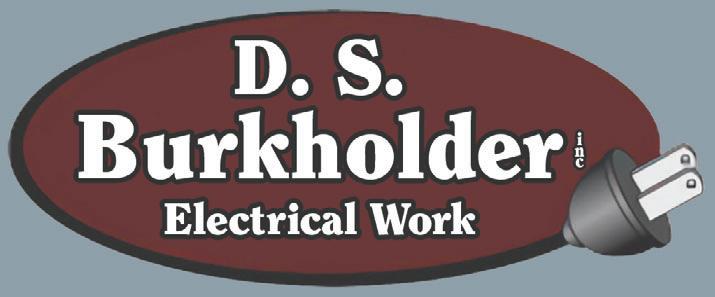

































Choose an Electrician
Electrical issues at home or in your business can be more than just inconvenient — they can be dangerous. As modern homes and commercial buildings rely increasingly on advanced technologies, electrical systems have become more complex. That’s why hiring a qualified, experienced electrician is essential for any repairs, installations, or upgrades. Whether you’re dealing with flickering lights or planning a major remodel, here’s what you need to know when choosing the right professional for the job.
Why You Should Hire a Professional Handling electrical repairs without proper training can be a recipe for disaster. Mistakes, even small ones, can lead to fires, electric shocks, or damage to expensive appliances. A licensed electrician is trained to identify problems quickly, perform installations safely, and ensure that everything complies with building codes. From full home rewiring to installing smart lighting systems, professionals offer peace of mind — and results that last.
What Electricians Can Do for You
Professional electricians handle a wide variety of services, such as: Installing and repairing lighting (indoor, outdoor, or specialty lighting); electrical panel and circuit breaker upgrades; wiring for new construction or renovations; equipment hookups and automated dimming systems; preven
tative maintenance and generator servicing and commercial systems like transformers, switch gear, and backup power solutions. They can also perform system inspections to ensure your electrical setup is both safe and efficient — something especially important in older homes or commercial properties undergoing changes.
Signs You Need an Electrician
Don’t wait until there’s a major issue to call an expert. Some warning signs that you should contact an electrician include: Outlets that are warm to the touch; flickering or nonfunctioning lights; a lack of grounded (threepronged) outlets; service panels that are over 25 years old and smoke or sparks coming from outlets.
These indicators point to underlying problems that could lead to electrical fires or system failures if left unaddressed.
Tips
for Finding the Right
Electrician
1. Don’t Delay Repairs: Addressing issues early can prevent costly damage. If you notice a potential electrical problem, seek help promptly.
2. Compare Multiple Options: For larger projects, contact two or three electricians. Ask about their licensing, experience, availability, and rates.
4. Investigate Reputation: Research online reviews and check with the Better Business Bureau. Occasional complaints are normal, but repeated or unresolved issues are red flags.
5. Get Written Estimates: Have electricians visit your home or business to assess the job and provide a written quote. This should include a project description, timeline, total cost, cleanup expectations, and insurance coverage.
6. Ask About Guarantees: Make sure you understand warranty terms and what guarantees come with their work.
7. Avoid Choosing Based on Price Alone: The lowest price doesn’t always mean the best value. Skilled work, longterm safety, and reliability are worth the investment.
8. Start Small if Needed: If you’re unsure about hiring someone for a large project, try them out on a small job first to gauge their professionalism and workmanship.
Whether it’s your home or a commercial property, electrical systems are far too important to trust to just anyone. Choosing a skilled, licensed electrician ensures that the work is done safely, up to code, and built to last. With the right professional, you can prevent problems before they start and enjoy peace of mind knowing your electrical system is in expert hands.
3. Check Credentials: Always choose an electrician with a current license and good references. Reputable professionals will be happy to provide proof of their qualifications.
HOW-TO...
Choose a Water Treatment Company
Choosing a water treatment company is a smart step toward improving your home’s water quality. Clean water is essential for drinking, cooking, bathing, and other everyday activities, so it’s important to make an informed decision when selecting a provider.
Various factors can affect your water quality. Whether your supply comes from a private well or a municipal source, water can pick up contaminants from natural minerals, old pipes, or treatment chemicals. These impurities can lead to hard water stains, unpleasant taste or smell, skin irritation, or even damage to plumbing and appliances.
Hard water, which contains high levels of calcium and magnesium, is one of the most common issues. It leaves mineral deposits in pipes, makes soaps and detergents less effective, and causes spots on dishes and glassware. While not typically harmful to health, hard water can make cleaning more difficult and reduce the lifespan of appliances.
Water treatment systems help address these problems by filtering out unwanted minerals and contaminants. As a result, your water will taste better, feel softer on your skin, and leave your
dishes and clothes looking cleaner. Most systems use multiple filters to remove sediments, chemicals, and other impurities. However, it’s important not to overfilter your water—beneficial minerals like calcium, magnesium, and iron are essential for your body’s health. A good water treatment company will help you find the right balance.
Before choosing a system, consider how you plan to use your treated water. Will it be for drinking only, or also for cooking, cleaning, and laundry? Estimating your usage will help determine the best system for your needs.
Cost is another important factor. Water treatment systems vary in price depending on size, technology, and maintenance requirements. Some companies offer affordable systems that meet basic needs, while others provide advanced solutions with longterm benefits. Don’t just go with the lowest price—compare providers based on quality, reliability, customer service, and reviews. Look for companies that test your water and explain their recommendations clearly.
Talk to neighbors, especially if you live in an area with known water quality
issues. Many of them have likely installed water treatment systems and can offer advice or referrals. Local businesses may also be able to recommend trusted providers. In addition, check local newspaper advertisements and look for online reviews and information.
It’s also helpful to ask for water samples or system demonstrations. Some companies offer free water testing or show how their system works so you can see the difference for yourself before buying.
A reputable water treatment company will test your water, offer tailored recommendations, and help you choose a solution that fits your home and budget. Just as importantly, they should provide service after installation, including maintenance, repairs, and customer support.

Choosing the right company may take time, but the longterm benefits are worth it. Cleaner, bettertasting water improves your quality of life and protects your home’s plumbing and appliances. With careful research and the right partner, you’ll enjoy peace of mind knowing your water is safe and healthy.
Thrift Shop
If you’ve never set foot in a thrift shop, you may be missing out on one of the most rewarding and budgetfriendly shopping experiences available. Whether you’re redecorating a room, starting a DIY project, or looking for oneofakind fashion or home finds, a good thrift shop can offer incredible value. But how do you choose the right one?
Here’s what to look for when selecting a thrift store that offers more than just savings—and why shopping secondhand is a smart and purposeful choice.
1. Look for a MissionDriven Store
One of the biggest distinctions between a thrift store and a standard secondhand retailer is the mission behind the merchandise. Many thrift shops operate under nonprofit organizations and use the proceeds to support charitable causes— ranging from community development and addiction recovery programs to housing, youth education, or global outreach. When you shop at a nonprofit thrift store, you’re not just saving money—you’re helping support a greater mission that uplifts lives and communities.
2. It’s Not Just About Clothing
While many people associate thrift shops primarily with clothing, the best ones offer so much more. Look for stores that carry: furniture and home décor; housewares and kitchen items; tools and
hardware; appliances; lawn and garden items; DIY materials like paint, stain, and building supplies; accessories and vintage finds and much more.
From mugs and power tools to artwork and dollhouses, you never know what treasures you’ll uncover. Thrift stores are known for constantly changing inventory, so each visit brings something new.
3. Shop the Unexpected
The fun of thrifting often lies in the unexpected. You might walk in looking for a coffee table and leave with vintage jewelry, a newtoyou blender, and the perfect picture to complete your gallery wall. Many thrift shops also run weekly or seasonal promotions—think discounts on drinkware, storage furniture, or colorful home accents—to keep the experience fresh and budgetfriendly.
4. Seek Out a Clean, WellOrganized Store
The best thrift shops put time into organizing their inventory and creating an inviting space. Look for shops that are welllit, clean, and arranged in a way that makes browsing enjoyable.
A curated and welcoming environment not only improves your shopping experience but also reflects the store’s dedication to serving its customers and community.
5. Check for Staff and Volunteer Passion
The people behind the shop make all the difference.
Many nonprofit thrift stores are powered by passionate volunteers who are eager to help you find what you need. Their enthusiasm for the shop’s mission and customer service can elevate your entire visit.
6. Support Sustainability and Reduce Waste Shopping at a thrift store is also an ecoconscious choice. Every reused item is one less product ending up in a landfill. From gently used appliances to salvaged building materials, thrifting promotes sustainability while helping others access affordable necessities. It’s a win for your wallet and the planet.
7. Consider Convenience Some stores offer pickup and delivery for larger items, making it easier to donate or take home bulky purchases. If you’re planning a renovation, downsizing, or redecorating, this added service can make a huge difference.
Finally, choosing the right thrift shop is about more than finding a bargain—it’s about supporting a cause, embracing sustainability, and discovering items that tell a story. Whether you’re on a tight budget, hunting for vintage gems, or looking to make a positive community impact, a good thrift store is the perfect place to begin. So take the leap—explore your local shops, support their mission, and enjoy the thrill of the thrift. You never know what treasures await.
HOW-TO...
Choose the Right Landscaper
A wellmaintained landscape adds beauty, curb appeal, and value to any home. From lush lawns to elegant garden designs, a professional landscaper can bring your vision to life in ways that are often difficult to achieve on your own. If you’re ready to improve your outdoor space, here are some tips for choosing the right landscaper.
Understand the Landscape Style You Want
Before you begin your search, consider the type of landscape that fits your property and lifestyle. Different styles require different expertise:
Formal gardens rely on symmetry and precise lines, often involving trimmed hedges and carefully placed plants. While informal landscapes appear more natural and relaxed, with plants arranged in a seemingly random but artistic way.
English gardens use the house as a central feature, integrating colorful plants, winding paths, and climbing vines for a cohesive look.
Oriental gardens focus on minimalism and serenity, often using rocks, moss, and evergreens for a tranquil effect. And finally, Woodland styles showcase native plants and aim to recreate a natural forest feel, demanding knowledge of local flora.
Choosing a landscaper who specializes in your preferred style is essential for achieving the best results.
Set a Realistic Budget
Landscaping can range from simple lawn maintenance to major redesigns. To avoid overspending, establish a clear budget upfront. Consider what you can afford not only for installation but also for ongoing maintenance. Sometimes, tradeoffs are necessary. For example, you may need to delay building a stone wall if you prioritize
installing an irrigation system. Decide which elements are most important to you and allocate your budget accordingly. Keep in mind that some landscapers offer more competitive rates for new clients or package deals.
Know Your Needs
Identify what services you need before hiring a landscaper.
Many companies offer a range of options, such as: lawn mowing and garden care (weekly or monthly); weed control; tree trimming and shaping; garden and flower bed installation; irrigation system maintenance and construction of retaining walls or other landscape features.
Understanding your specific needs helps you narrow down which professionals are best suited for the job.
Ask for Referrals and Do Your Research
Word of mouth and looking in your local newspaper are
Choose an Internet Service Provider
In today’s digitally interconnected world, a reliable internet connection is essential. The process of choosing the right internet service provider (ISP) can be complex, with various
factors to consider such as prices, packages, bandwidth, and installation processes. While some areas may have limited options, others offer many providers. Understanding the fundamentals can help
you make informed decisions, and avoid frustration. Whether you are changing locations or seeking to improve your current service, here are key factors to contemplate when selecting an ISP:

Choose Garage Doors
Few exteriorfacing segments of a home are more noticeable than garage doors. Attractive, welldesigned and wellmade garage doors extend the character of a home and provide a necessary function.
If your garage faces the front of the house, a new door could dramatically improve your curb appeal and change the overall look of your home. If you’re selling, worn or dated doors tend to say a lot about the condition of the rest of the home.
32nd ANNIVERSARY

Good’s Lawn Care

A garage door is also an excellent security asset for your home, allowing you to secure your vehicle inside.
Shrub
the most effective ways to find a reputable landscaper.
If you admire a neighbor’s yard, ask who they hired and whether they’re satisfied with the work. Additionally, an experienced landscaper will highlight their experience and describe their services in advertisements.
Don’t hesitate to ask potential landscapers for references from current or
Price
Pricing is critical. Most ISPs charge monthly, so it’s important to determine what price range fits your budget. Generally, faster services cost more. Compare prices from different providers to find the best deal, and inquire about additional fees. Transparency varies between providers, so research the upload and download speeds offered at each price point. Higher speeds generally translate to better service.
Connection Type
Broadband connections are typically provided via coaxial cables, fiberoptic cables, or telephone lines. Both coaxial and fiberoptic cables offer highspeed internet, while DSL (digital subscriber line) via telephone lines usually offers lower speeds.
Wireless broadband options, like those provided by mobile and satellite companies, are increasingly available, but are often dependent on proximity to towers or satellites. Additionally, having the right WiFi equipment is crucial for connecting your devices and maximizing your
If you’re thinking about installing a new garage door, you may be surprised at just how many options are on the market — and how affordably they can be installed.
The Look
Garage doors have seen an explosion in styles, materials and colors that are designed to match the architecture of any home, from rural barns to craftsman bungalows or sleek urban getaways. If you thought your choices were limited to simple sheet metal styles, think again.
Some garage door retailers will be able to help you visualize what the different doors would look like — complete with color and material samples, and perhaps even software that will show a picture of what your home would look like.
You should also pay close attention to the materials. Today’s garage doors can be made from expensive hardwoods, textured vinyl, fiberglass or basic aluminum, all of which will have a big impact on the look and longevity of your doors.
Pay close attention to the maintenance needs of what
past clients. A solid portfolio and good reviews are strong indicators of reliable service.
Consider Availability and Local Rules
Before hiring, ask how frequently the company can perform maintenance. Availability is key to keeping your yard looking its best.
Also, be aware of local ordinances. Some communities
internet connection. It’s important to protect your network and devices from potential security threats. Inquire about the network security features or addon options offered by potential providers.
Purpose and Usage
Identify your internet needs. Highspeed connections are essential for streaming movies, online learning, or remote work. For basic tasks like checking email or browsing websites, a slower, more affordable service might be sufficient. Knowing the primary purpose of your internet connection can help you choose a service that meets your expectations without unnecessary costs.
Special Offers and Bundles
Many ISPs offer new customer promotions or bundle deals, which might include free service for a few months, complimentary equipment, or upgrades. Bundles that combine internet, phone, and cable TV services can offer significant savings. Check with local
ever material you choose.
Some will hold their color longer than others, and real wood doors can require regular staining and sealing every few years to keep them looking spectacular.
Insulation
Depending on climate, the insulation of your garage door can be an important factor to help reduce your energy bills.
Just like windows and insulation in your attic, garage doors come with an “R factor” rating that tells you how well they insulate your home from outside temperatures. This is especially important in heated garages. Even on unheated garages, an insulated door can make a positive impact on your energy usage if it can keep the hot and cold weather away from the interior of your house.
In general, the higher the “R value,” the better off you’ll be.
Local Requirements
Before you make the purchase, you should also check to see if your city, county or homeowner’s association has any special requirements for garage doors.
Give
have restrictions on noise or hours for landscaping work. Make sure your chosen company complies with these rules.
With the right landscaper, your outdoor space can become a beautiful, relaxing extension of your home. All it takes is a little planning— and the right team to bring it all together.
providers to find a package suiting your needs. If you already have cable or satellite TV, you might be eligible for discounts by purchasing internet service from the same provider. Similarly, some mobile phone companies offer residential internet service packages. Explore these options for the best deal.
Customer Service
Customer service is a crucial aspect to consider. Read reviews of each company and inquire about support staff location and average wait times. Assess the company’s track record for handling outages and technical issues. Determine if there are charges for technician visits and how they manage defective equipment. Conducting thorough research on each company’s customer service can help avoid unpleasant surprises after signing a contract. By carefully evaluating these factors, you can make an informed decision and select an ISP that meets your needs in our digitally driven world.
Homeowner’s associations, in particular, may have very picky requirements about what materials and styles can be used in your neighborhood. Make sure your choice meets with the approval of any local authorities or boards that control their use.
Safety
A garage door is typically the largest moving object installed in any home, and safety should be a consideration.
Ask your garage door retailer about any special safety features on the door you select. Make sure it will be installed according to all applicable safety codes in your area.
Opener
Finally, when you install a new garage door it’s usually a good idea to install a new opener, too. Make sure you factor this into the cost and explore all your options — including the latest models that can be closed remotely via smartphones and operate very quietly and efficiently.
HOW-TO...
Find the Right Pharmacy
Pharmacies are becoming an increasingly vital part of the U.S. healthcare system. Beyond just filling prescriptions, many now serve as convenience centers, offering everything from toiletries and snacks to home goods and beauty products.
Major pharmacy chains like CVS and Walgreens provide drivethru services and expanded health offerings such as vaccines and basic urgent care treatments. With multiple locations across the country, these chains make it easy to access medications whether you’re traveling for work or leisure.
However, this convenience can sometimes come at a cost. Large chains often manage high customer volumes, which can impact the level of personal care. In contrast, independent pharmacies often earn high ratings for service, accuracy, and customer interaction. These smaller establishments focus heavily on prescription services, which drives their commitment to quality.
If you’re deciding between a large chain or a local independent pharmacy, here are some key points to help guide your choice:
Operating Hours
One of the most important factors to consider is when the pharmacy is open. If you’re unwell, waiting for a pharmacy to open may not be an option.
Try to find a location with hours that suit your lifestyle. In some urban areas, 24hour pharmacies are available to fill urgent prescriptions at any time.
Chain pharmacies typically have extended hours, including evenings and weekends. Smaller, independent pharmacies may close earlier, but they often provide additional services like free local delivery or custom medication packaging.
Whichever pharmacy you choose as your regular spot, always be aware of where you can find a 24hour location nearby in case of an emergency.
Proximity
Having a pharmacy close to your home, job, or school can save you both time and stress.
Many communities have independent pharmacies with multiple locations, so you might still have convenience along with quality service. A nearby pharmacy is especially helpful in urgent situations where quick access is essential.
Insurance and Costs
Make sure your pharmacy accepts your prescription drug plan. Not all pharmacies honor every insurance policy.
Call in advance to confirm coverage. Paying for prescriptions outofpocket can become a financial burden.
If you don’t have robust insurance, ask about discount programs or generic








medication options. Most pharmacies carry costeffective generic alternatives, and some also offer savings programs.
If you’re on Medicare, especially Part D, be sure to check that your chosen pharmacy accepts your specific plan. This ensures you get the medications you need without unnecessary costs.
Customer Care
The quality of service can greatly affect your overall experience.
Are the pharmacists approachable? Do they know your name? Can you count on them to answer questions and offer clear advice? Trustworthy and knowledgeable staff make managing your health easier.
If you’re someone who values a holistic or alternative approach to wellness, seek out pharmacists familiar with natural remedies and integrative options.
Many pharmacies also provide mobile services, including online prescription refills and virtual consultations, making it even easier to stay on top of your health. Finding the right pharmacy may take a bit of time and research, but doing so can significantly improve your healthcare experience. With a little effort, you can find one that suits your medical, financial, and personal needs.






Choose a Car Wash
Keeping your vehicle clean does more than boost its appearance. Regular car washes help protect your car’s paint, preserve its value, and extend its overall life. While traditional automatic car washes are still widely used, touchless car washes have become a preferred choice for those who want a gentler approach to car care.
If you’ve never used one or are trying to choose the best facility near you, understanding how touchless car washes work—and what to look for—can help you make the right choice.
What Is a Touchless Car Wash?




A touchless car wash uses highpressure water streams and powerful cleaning solutions to clean your vehicle—without anything actually touching the car’s surface. That means no brushes, no spinning cloth strips, and less risk of damaging your car’s paint or trim.










Touchless systems are especially popular with owners of newer vehicles, highend cars, or those with special coatings like wax or ceramic finishes that they want to protect.



Why Choose a Touchless Car Wash?
1. Less Risk of Surface Damage - Traditional car washes rely on physical contact, often using large brushes or cloth strips that can trap grit and debris. These materials can leave behind scratches, swirl


marks, or scuffs. Because a touchless wash uses only water and cleaning agents, your vehicle gets cleaned without anything coming into contact with the paint.
2. Paint and Coating Protection - If your vehicle has recently been detailed, waxed, or coated with a ceramic finish, the last thing you want is to ruin that investment with an abrasive wash. Touchless options preserve those protective layers while still getting rid of dirt, salt, and road grime.
3. Speed and Convenience
- Most touchless car washes are fast—usually under 10 minutes—and operate 24/7. That means you can clean your car early in the morning, during your lunch break, or even late at night, all without an appointment. It’s a simple way to maintain a clean vehicle, even with a busy schedule.
4. Gentle on Custom Features - Because there are no brushes or moving parts coming into contact with your car, there’s less chance of damage to antennas, side mirrors, spoilers, or other custom modifications. The highpressure system is also great at reaching into wheel wells and other tight spots, helping wash away things like winter road salt.
What to Look for in a Touchless Car Wash
Not all touchless washes offer the same level of service. To get the best results, here are a few things to consider:
1. Wash Package Options
- Most touchless car washes offer multiple wash packages at different price points. A basic wash usually includes a presoak, rinse, and spotfree finish. Midrange packages may add services like a clear coat protectant or highpowered drying. Premium options often include extras like underbody cleaning and additional sealants. Choose the level that best fits your car’s needs and your budget.
2. Convenience Programs - If you wash your car often, look for locations that offer loyalty programs such as unlimited wash passes or fleet cards. These options can save money over time and make it easier to stay on top of regular maintenance.
3. Customer Satisfaction Policies - A good car wash will stand behind its service. This shows that the business values its customers and aims to provide a consistent level of service. The bottom line is touchless car washes offer a safe, efficient, and effective way to clean your vehicle. With no brushes or cloths touching your car, the risk of paint damage is minimized—making them a smart choice for those who care about preserving their car’s finish. By choosing a quality touchless wash that offers a range of services and stands behind its work, you can keep your vehicle looking its best with very little hassle.
HOW-TO...
Select a Storage Building
Over time, belongings begin to accumulate—luggage, garden tools, seasonal gear, and rarely used sports equipment. What starts by taking up closet space can quickly spread to the garage. If you’re finding that your home is starting to look more like a storage unit, it may be the right moment to invest in an outdoor storage building.
Smaller, temporary storage sheds are available at major home improvement retailers and can often be assembled on your own. However, they may lack longterm durability. Larger, more permanent structures are typically built by local shed manufacturers, delivered in one piece, and might need a solid foundation. Before making a purchase, consider these important factors:
Construction Quality
Durable construction and quality materials are essential. While a betterbuilt shed might cost more up front, it pays off over time. Many manufacturers deliver solid products, but others may cut corners for a quick profit. Stick with a trusted, wellreviewed shed supplier or dealer.
Wellconstructed sheds are much like small houses. The walls are strong, the roof trusses are reliable,
and the flooring is built to last. A proper roof will protect against leaks and bad weather, ensuring your belongings remain secure and dry.
Don’t underestimate the importance of the floor. A quality floor should be built with solid joists and thick decking to prevent sagging. It’s worth spending extra to get flooring that meets or exceeds your needs.
Smart Design
Functionality is another major consideration. Choose a design that gives you the most value for your money.
Your shed should have ample room for storage shelves and open floor space. Think about everything you’ll want to keep inside. Some homeowners use these buildings to store riding mowers; others need shelving for small hand tools. You might want added lighting or more windows. Door size and swing direction could also be key, especially if you plan to move large items in and out. If you need to hang tools, look for walls that support hooks and brackets.
Attractive exteriors are also a plus. With a wide variety of trim, siding, and roofing options available, it’s easy to find a shed that
enhances your property without overspending.
Even if curb appeal isn’t your top priority, keep in mind that a goodlooking shed can increase your home’s overall charm and value.
Choosing a Retailer
An experienced retailer will guide you toward the best shed for your needs and budget.
Choosing a company that builds and installs the shed can save time and headaches. Poorquality imports and confusing instructions can lead to frustration— and an unusable product. A professional builder can ensure your structure looks great and functions properly from day one.
If cost is a concern, ask about financing or payment plans. These often cost less per month than renting a commercial storage unit, helping you save in the long run.
Buying a shed with reliable construction, practical design, and from a reputable dealer is a smart move. It provides you with a longlasting and convenient solution for your storage needs.
Let the experts manage the delivery and setup— while you enjoy the view from your kitchen window.
Hinkletown Sewing

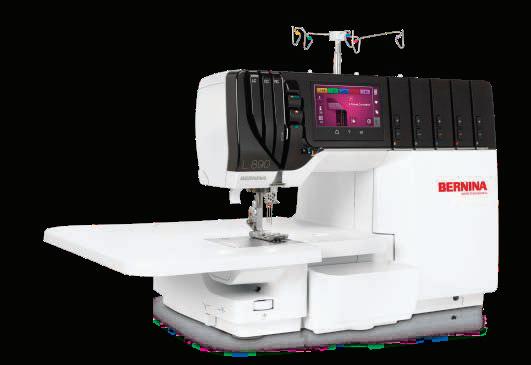

decorati plicati

Long Arm Quilters with or without Automation
• Large throat space for even bigger quilts
• Ergonomic and comfortable handling
• You Choose, on Frame or on Table

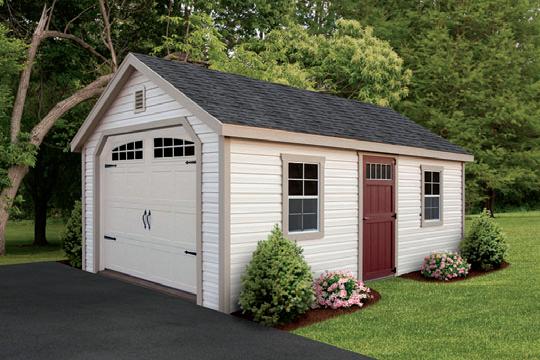
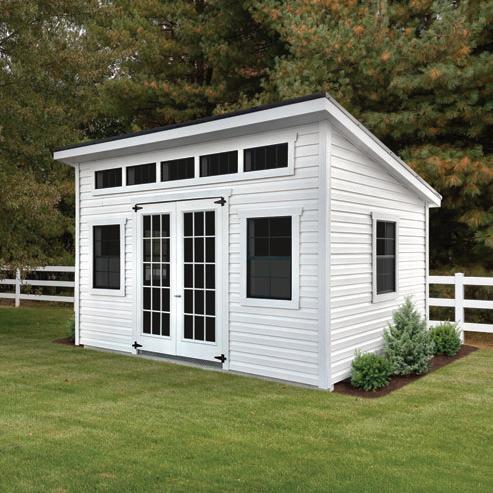
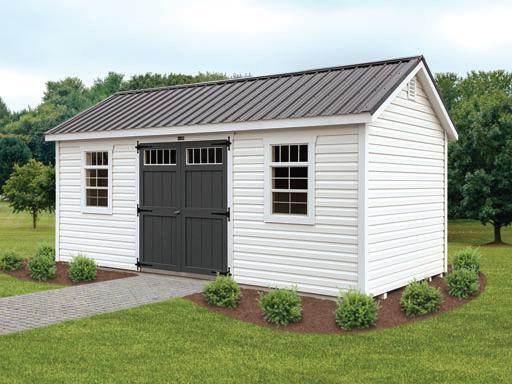
Choose a Sewing Machine
Whether you’re picking up sewing as a relaxing hobby or starting a small business, having the right sewing machine is key. Many creative individuals enjoy designing their own garments and accessories, or adding creativity to their current garments with embroidery, selecting fabrics and threads to suit. Owning a sewing machine also makes it easy to perform quick repairs on clothes.
Whatever your reason for sewing, choosing the right machine today is more complicated than it once was. Modern machines go far beyond a simple needle and thread. They now come in various sizes and styles, often featuring computerized technology that adds many features. Here are some helpful suggestions to guide you in selecting the best sewing machine for your needs:
Start by reading reviews in sewing magazines or on specialized websites. Online blogs and forums can be a source of information, offering opinions on leading brands and dealers. Expect to find both praise and criticism, which will help you form own judgment. Next ask your sewing friends about their choices and experiences. Brand websites showing the different models may help you see the features
available, but remember that sometimes the machines may be available at the local dealer for a lower cost than the online list price.
Consider the type of sewing you’ll be doing. Are you interested in garmentmaking, basic mending, quilting, recycling clothing with new creative additions and/or embroidery? Will you be working with heavyduty fabrics like denim or upholstery? How much throat space do you need? Keep in mind which accessories – like special feet or embroidery hoops –come with the machine or can be added later.
Stick to your budget, but avoid buying a lowcost machine simply because it’s cheap. Offbrand models may seem like a bargain but may lack durability, essential features and quality stitching, making sewing frustrating rather than fun.
If you plan to sew regularly, invest in the highest quality machine you can afford – even if it means starting with a simpler model. Most brands offer optional accessories that can be added later as your skill and needs grow.
For small projects or occasional sewing, a compact machine might be ideal and can be used on a standard table. More advanced machines and projects may require a
dedicated space in your home.
Never purchase a sewing machine without trying it first. Visit a sewing shop to test various models. This allows you to get a feel for different machines and develop a relationship with a retailer you trust. A helpful shop owner or staff can offer honest advice and explain key features. Since your machine will need service from time to time, choose a store you’ll feel comfortable returning to.
Before heading out, jot down features, brands, and models that appeal to you. The handson approach gives you the most accurate sense of how each machine performs. Pay attention to whether threading and tension adjustment are straightforward. Ease of use will be important, especially if you’re just starting out.
Be sure to check the warranty, return and maintenance terms – these should be part of the purchase. Do you receive classes to introduce you to the machine? Is this dealer able and willing to support you with help if needed? Can you trade this machine in the future for a more advanced machine, should your needs or desires change?
Remember, seeking a local store with a reputable, supportive dealer is key.
HOW-TO...
Find the Right Orthodontist
Visiting your dentist regularly for cleanings and fillings is just one aspect of maintaining healthy teeth and a beautiful smile. Many people also require alignment of their teeth and jaws, which requires the specialty of orthodontics.
When most people think of orthodontics they most likely think of braces.
But braces are just one option used by these dental specialists trained in straightening and aligning the teeth, bite and jaws. They use braces, aligners, and orthopedic alignment correctors such as MARA, Herbst, Forsus, etc.
These processes take time, but the result of their treatment will be a healthier bite and a more attractive smile!
If you think an orthodontist could help improve your bite and smile, here are some tips for finding a good one:
Service
Quality orthodontists perform most of the work with a highly trained staff. The best orthodontists see you as a valued patient and treat you as an individual. You also need a doctor who can communicate well, listen to questions and answer them clearly.
Orthodontic technicians are part of the treatment team, so it is wise to form good relationships with
them. They have undergone rigorous training, and will contribute during all phases of treatment.
Look for an orthodontist who knows the value of time. You should not have to wait a long time in the waiting room.
The waiting area should be comforting and soothing. Focus on how the staff treats you and others.
As children represent a large portion of patients for orthodontists, watch their reactions closely. If they seem relaxed and comfortable, then you are in the right place.
You may also experience some anxiety while receiving treatment. That is expected. It is how this professional treats you, and the environment around you that will make a difference. Because treatment takes time, you should develop a good rapport with your orthodontist.
Technology
Ask each prospective orthodontist about the technologies they use. There are several systems, each quite different one from the other.
Each professional should explain the tradeoffs between systems. Each has advantages and disadvantages. Have the orthodontist explain why he or she prefers one over the other.
Clear Aligners
Clear aligners are a very common choice for people who care about their appearance. Adults, professionals, and children can receive treatment without having it hinder their appearance.
Orthodontists will also have suggestions on which modality might work best for your situation.
If you are interested in these treatment modalities, ask your orthodontist why he or she uses a particular type. It will guide your choice in which system you choose.
Orthodontists have at least six to seven years of education after college, which includes four years of dental school and two to three years of orthodontics residency. There is not just emphasis on tooth movement, but bone movement and development as well. Therefore the specialty is now referred to as Orthodontics and Dentofacial orthopedics.
Early treatment is encouraged to improve boney relationships while the young patient is pliable and growth can be directed to improve occlusion and space needed for the secondary teeth.
Orthodontic treatment is a significant investment. The right mix of education, certification, experience and personality should make all the work worthwhile in the end.















Choose a Bath Design and Remodeling Company
Renovating a bathroom is one of the most impactful home improvement projects you can take on. Whether you’re upgrading a dated space, installing new fixtures, or undergoing a complete redesign, selecting the right bath design and remodeling company is essential for ensuring the results meet your expectations. To create a space that’s functional, stylish and tailored to your needs, here are the key factors to consider when choosing the right professionals for your project:
Comprehensive Services
A quality remodeling company should offer a full range of services—from minor upgrades like new faucets or shower doors to fullscale renovations that include custom cabinetry, tiling, and lighting. Look for a provider that can handle every aspect of the project, including design, demolition, installation, and finishing work. This allinone approach streamlines the process and ensures consistency in quality and style.
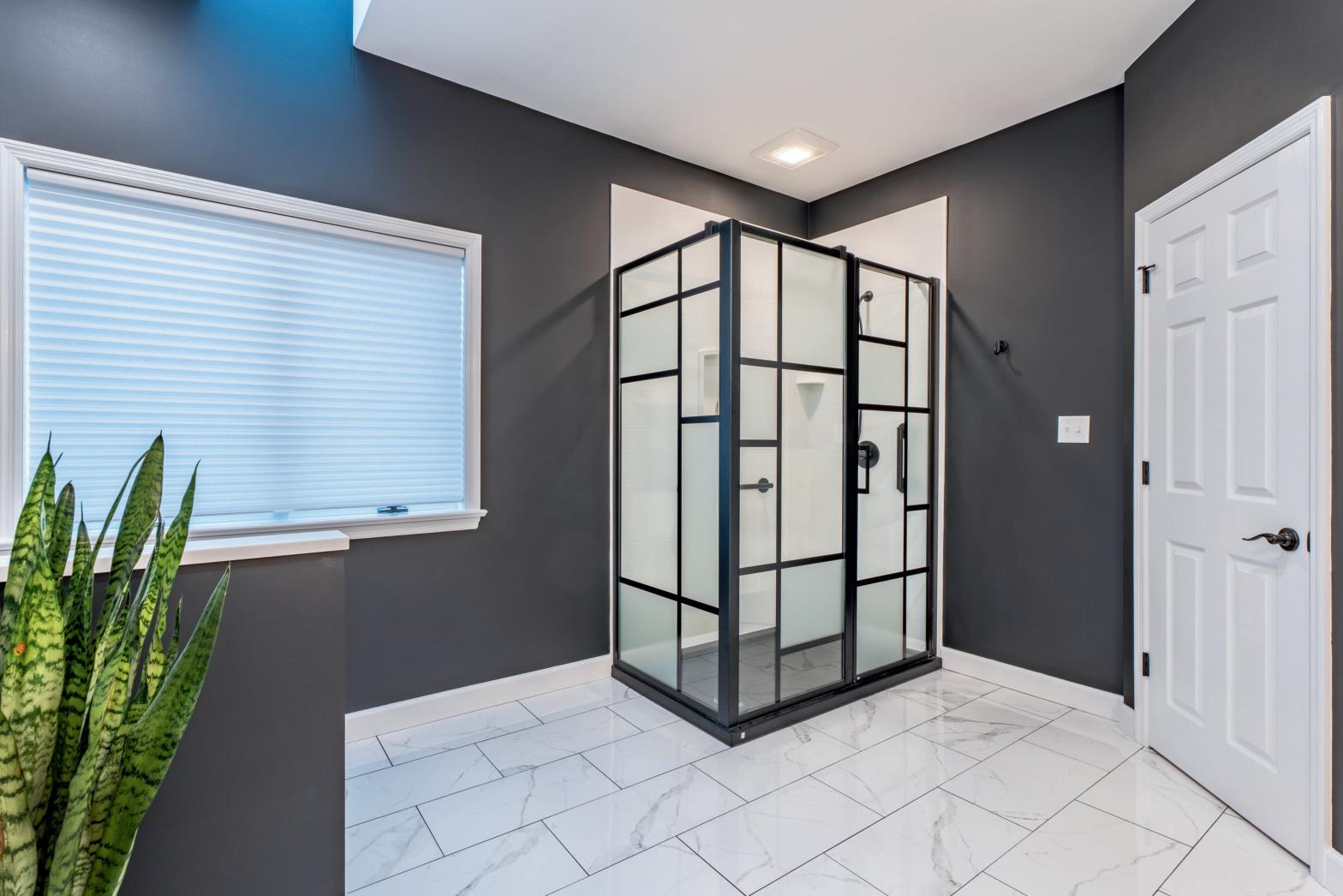
Expertise in Custom Design
Each bathroom is unique, and your remodeling partner should be able to offer personalized design solutions that suit your space, preferences, and budget. A company with design experts on staff will be able to help you visualize layout changes, recommend product combinations, and provide suggestions that enhance both functionality and aesthetics. Some companies offer inhouse or virtual showrooms, which can make exploring
finishes and fixtures more accessible and enjoyable.
Access to Quality Products
The best bath remodeling companies partner with reputable brands to provide customers with durable, highquality options. From vanities and countertops to toilets, faucets, and lighting, having access to a wide range of trusted products gives you greater flexibility in style and pricing. If possible, visit a showroom where you can see and test products in person— this can be invaluable when selecting items like shower heads, lighting fixtures, or cabinetry finishes.
Clear Project Planning and Communication
Look for a company that offers a detailed project plan from the start. A good remodeling company should provide an inhome consultation to understand your needs, followed by a clear design proposal and timeline. Transparency is key—make sure the company outlines what to expect in terms of scheduling, pricing, and any possible disruptions to your daily routine. Frequent and clear communication throughout the project will help prevent misunderstandings and keep your renovation on track.
Skilled and Courteous
Installers
The installation team plays a significant role in the success of your remodel. Reliable companies employ experienced, professional installers who take pride in their work, show up on time, and maintain a clean and safe job site. Ask about the
qualifications of the installation crew, whether they are inhouse employees or subcontractors, and read reviews to see how past customers describe their experience.
Customer Support and Aftercare
The remodeling process doesn’t end when the final fixture is installed. Choose a company that stands behind its work and offers support if you have questions or need followup service. A company with a longstanding reputation and a track record of satisfied customers is more likely to honor warranties and provide reliable service in the years to come.
Proven Track Record
Experience matters. Seek out companies that have been in business for many years and have a portfolio of completed projects. Online galleries, testimonials, and case studies can give you a better idea of the company’s capabilities and style. Look for consistent praise in areas such as timeliness, craftsmanship, and professionalism. Finally, selecting a bath design and remodeling company is about more than finding someone to install new tiles or fixtures—it’s about partnering with professionals who can bring your vision to life. With the right team, even a small bathroom can be transformed into a stylish and highly functional space that adds comfort and value to your home. Take the time to research, ask questions, and explore your options—you’ll be glad you did.
HOW-TO...
Choose an Accounting Firm
Selecting an accounting firm is a critical decision— whether for your personal finances or a growing business. You’re not just hiring someone to file taxes or balance books; you’re choosing a partner who will help guide major financial decisions and protect sensitive information.
A great accounting firm does more than crunch numbers. The best firms serve as trusted advisors who contribute to your longterm success. Here are key qualities to look for when evaluating an accounting firm:
Proven Experience and Industry Knowledge
Start by considering the firm’s experience. The most reputable firms are staffed with certified public accountants (CPAs), skilled bookkeepers, and financial professionals who understand the complexities of tax codes, financial reporting standards, and industryspecific regulations.
Look for a firm with a history of success. Longevity often signals that a company is dependable, knowledgeable, and able to adapt to changes in tax laws and financial practices. Ask about their experience with businesses like yours— particularly within your industry. A firm familiar with
can anticipate challenges and offer tailored advice.
Comprehensive Services
The needs of individuals and businesses evolve over time, and your accounting firm should be equipped to evolve with them. While nearly every firm can handle routine bookkeeping and tax preparation, the strongest partners offer a wide range of financial services.
A wellrounded firm should be able to assist with strategic planning, cash flow analysis, payroll management, internal controls, and audits. If you’re planning for growth, consider whether the firm has experience with business valuation, succession planning, and mergers and acquisitions—critical areas where expert insight can protect and grow your investment.
It’s also worth noting that some firms provide guidance in personal financial planning. This is particularly useful for small business owners whose personal and business finances are closely linked. Having one firm that can advise on both fronts adds consistency and confidence to your financial strategy.
Commitment to Client Service Service quality is a defining factor in a successful accounting relationship. The best firms prioritize
responsive, reliable access to your primary contact. You shouldn’t have to chase down answers—great firms provide timely, detailed guidance to help you make informed decisions.
Look for firms that emphasize longterm relationships. Beyond completing tax returns or compiling reports, the best accountants invest in understanding your goals and challenges. They work collaboratively with you to find proactive solutions, not just reactive fixes.
You can also check client reviews and professional references. A firm’s reputation in the community and among its peers is often a strong indicator of the quality of service you can expect.
Final Thoughts
Choosing an accounting firm is about more than qualifications — though those are important. It’s about finding a partner who understands your financial goals and has the expertise, services, and dedication to help you achieve them.
Whether you’re launching a startup, growing an established business, or managing personal wealth, the right firm can make a significant impact. Do your research, ask questions, and look for a firm that fits your current needs while positioning you for future

Your Trusted Partner for Every Stage of Financial Growth

Why Pennoptic?
• Decades of experience across Lancaster’s key industries
• Full-service solutions—from tax prep to succession planning
• A team of CPAs and advisors committed to your success Proactive, responsive service that builds long-term trust
Whether you’re managing personal finances or scaling a business, we’re here to help you navigate today’s challenges and tomorrow’s opportunities.

Choosing an accounting firm isn’t just about tax returns— it’s about finding a partner you can trust through every financial decision. At Pennoptic, we go beyond the basics to deliver strategic insight, industry expertise, and personalized service that grows with you. Call or visit us online
can support your goals!
www.pennoptic.com
Find the Right Physical Therapist
Recovering from an injury, surgery, or dealing with chronic pain often requires rehabilitation—and choosing the right physical therapist (PT) is key. A qualified PT will help you better understand your body, recommend appropriate exercises, and guide you toward lifestyle adjustments that support healing and improved function. Here are some tips to help you choose the right professional:
Personalized Attention:
Find out if the clinic provides oneonone treatment sessions. Some clinics schedule patients in tight 15minute windows, which limits the therapist’s ability to deliver thorough, highquality care. Scheduling longer sessions allows time for questions and a full explanation of your progress, and it can reduce time spent waiting for your appointment.
Continuity of Care: Will you be seen by the same therapist or team each visit? Many clinics rotate patients among different therapists, making it hard to maintain a consistent treatment plan. Seeing the same provider ensures your progress is tracked more effectively and often leads to better outcomes.
Do Your Homework: PT clinics can differ widely in their approach and patient experience. Look at online reviews and ask people you trust — friends, neighbors, or family members — if they can recommend a physical therapist they’ve had success with recently.
Timely Appointments:
How soon can they schedule your first visit? In Pennsylvania, patients can start physical therapy without a referral if the PT is certified
in Direct Access. The sooner you begin therapy, the quicker your recovery may be.
Understand the Costs:
Physical therapy pricing varies significantly depending on the type of clinic—whether it’s hospitalaffiliated, physicianowned, or independently operated. Ask if they’ll verify your insurance and explain what’s covered. For those paying out of pocket, it’s crucial to compare rates, which can range from $100 at an independent clinic to over $400 at a hospitalowned facility.
Privacy Matters:
Ask if the clinic offers private rooms for evaluations.
A private setting is especially important during your first appointment so you can comfortably discuss your symptoms and history.
Convenient Location:
A clinic near your home or workplace makes it easier to keep up with appointments, reduces travel time, and helps you stay committed to your treatment plan.
Qualifications Count:
Check your therapist’s credentials. They should be a licensed Doctor of Physical Therapy (DPT). While many therapists treat a wide range of conditions, if your case is more complex, look for someone with specialized certification or advanced training.
Customized Treatment Plans:
A good PT should tailor your therapy plan to your individual needs, assessing your progress regularly and adjusting your goals as necessary. Physical therapy isn’t onesizefitsall, and your plan should reflect that.
Specialized Services & Certifications
Not all physical therapists— or clinics—are the same. Some offer specialized services that can make a big difference depending on your condition or recovery goals. If you’re dealing with something specific—like pelvic floor dysfunction, TMJ, vestibular issues, postconcussion symptoms, or neurological conditions—look for a therapist who has advanced certifications or extensive training in that area.
Credentials like OCS (Orthopedic Clinical Specialist), NCS (Neurologic Clinical Specialist), Certified Strength and Conditioning Coach (CSCS), Board Certified Geriatric Clinic Specialist (GCS), or certifications in manual therapy, or Astym Therapy can signal advanced expertise. Ask about the clinic’s specialties and whether there’s a therapist on staff who regularly treats your specific issue.
Choosing a PT with the right experience can help you achieve faster, more effective results.
Free Consult Calls:
Many clinics offer free phone consultations. This is a great opportunity to explain your symptoms and get advice on whether physical therapy could benefit you. You might even receive athome suggestions to try before your first visit.
Physical therapy blends science, experience, and a personal touch. Choosing the right therapist—and committing to the process—can help you recover fully and return to doing what you love. Don’t wait to take the first step toward healing!
HOW-TO...
Find the Right Tree Service
Healthy, wellmaintained trees add beauty, shade, and value to your property. But caring for them properly requires time, skill, and the right equipment. Overgrown limbs can become safety hazards, and disease can quickly damage or kill a tree. If you’re not equipped to handle these issues yourself, hiring a professional tree service is a smart solution.
Here are several tips to help you choose a reliable, experienced tree care company:
• Ask for recommendations. Start by talking to friends, family, and neighbors who have used local tree services. Their firsthand experiences can help you find companies that are trustworthy and skilled. You can also explore local advertisements, business
directories, and online reviews for additional options.
• Do your homework. Research each company thoroughly. How long have they been in business? Are they licensed and insured? Do they have experience with your specific needs—such as storm cleanup, pruning, or large tree removal? Ask for references and check with the Better Business Bureau for complaints or red flags. A few minor issues are common, but how a company handles those problems can speak volumes about their professionalism.
• Be detailed when requesting an estimate. Give clear information about the work you need—such as the type of trees, access to the site, and any special concerns. If boundaries are shared with neighbors, mark the trees in question to avoid confusion. Keep
in mind, the lowest price doesn’t always mean the best value. Tree work can be dangerous, and a higher price often reflects proper safety practices, experience, and insurance coverage.
• Confirm insurance coverage. Tree work involves risk, so ensure the company carries adequate insurance. This should include general liability, workers’ compensation, and coverage for potential damage to property, structures, or vehicles. Don’t hesitate to request proof of insurance before work begins.

• Review past work. Ask for photos or a portfolio of completed jobs. Many companies post galleries on their websites or social media. This will give you a better idea of their approach to tree care, aesthetics, and professionalism.
Choose An Insurance Company
Insurance is one purchase you hope never to use, but when the unexpected happens, you want to be confident your family, home, car, or business is well protected.
Picking the right insurance agency, company, and policy is crucial to ensuring you have the protection you need. A key factor is how smoothly the
company handles claims when it matters most. Don’t base your choice solely on flashy advertising or low prices, as these can sometimes be misleading.

Select an Auto Repair Shop
Most people know someone handy with car repairs—a family member, friend, or neighbor. While they might handle basic fixes, modern vehicles are often too complex for backyard mechanics. That’s when finding a reliable auto repair shop becomes essential.

New car owners may prefer to stick with
dealerships for scheduled maintenance, but older vehicles usually need more frequent care. Building a relationship with a trustworthy, professional auto repair shop early can


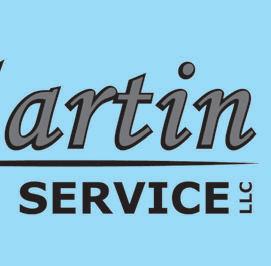

• Get a written agreement. Before scheduling any work, request a detailed written estimate. This should include the scope of the job, the estimated cost, the expected timeline, and cleanup responsibilities. Will they haul away debris? Will stumps be removed or ground down? Clarifying expectations in writing helps
Customer Service
Matters
Excellent customer service can make one insurer stand out from the rest. Take the time to research thoroughly. Visit insurance company and agency websites to learn about their mission, values, and history. How long have they been operating? Check local newspaper advertisements, reviews and ratings online, and ask friends or family about their experiences with their insurers. Understanding how a company treats its customers during the claims process is especially important.
When choosing a company, find out who you would contact if you need to file a claim. Some insurers handle claims directly with clients, while others involve local agencies in the process. Often, it’s a mix—your company might provide
save you money and stress in the long run. Skilled mechanics can extend your car’s life and help prevent costly repairs. Plus, if something unexpected happens—like a major breakdown or accident— having a trusted shop can make a huge financial difference.
avoid misunderstandings later.
• Prioritize safety. Safety should never be overlooked.
Crew members should wear proper protective equipment—helmets, eye protection, and steeltoe boots. Tree climbers must use specialized safety gear, including harnesses and
a 24hour emergency line while your agent manages regular inquiries during business hours. Knowing this upfront can save stress later.
Understand Your Policy
Insurance premiums and coverage options vary widely between companies. Your agent should clearly explain all available options so you can make an informed decision.
Look closely at coverage details and costs. If you’re new to buying insurance, your agent should act as a guide, not just a salesperson. Policies can be complex, with different coverage levels, deductibles, and exclusions. Don’t pick a policy based on price alone—low premiums may mean higher deductibles or fewer benefits.
Some insurers offer discounts when you bundle
record for customer service and reliability.
ropes. If workers show up without the appropriate equipment, contact the company immediately to resolve the issue before work proceeds. By following these steps, you’ll be more confident in choosing a tree service that’s professional, insured, and capable of delivering highquality results.
multiple policies, like home and auto insurance. Always ask about such discounts and any special coverage that might fit your unique needs. Review your policy regularly to ensure it still meets your requirements as your life changes.
Check Financial Strength
The financial stability of an insurance company is critical. Independent agencies rate insurers based on their financial health and ability to pay claims. Your agent can explain these ratings and help you choose a financially strong company that will be reliable when you need them most.
While price is important, it’s only one piece of the puzzle. Choose a company that offers fair rates, reliable customer service, and solid financial footing to ensure you’re protected when you need it most.
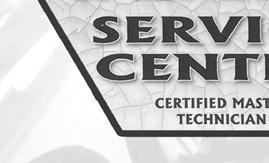









At May’s Service Center, we perform services, such as Inspections, Oil Changes, Transmissions and everything in between, like most repair shops.
But Did You Know?
We offer services that the other auto shops don’t, like:

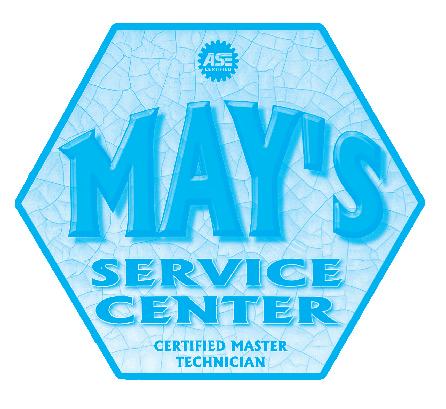
• Auto Diagnostics
• A/C & HVAC Repair and Maintenance
Even new cars will eventually require services such as oil changes, tire replacements, or more significant repairs. If you don’t already have a regular mechanic, now is a great time to find one. Here are some tips to guide your search:
Services Offered: Modern cars need advanced diagnostics and specialized repairs. Ensure the shop can handle a range of services— brakes, electrical systems, warranty work—and ask if they provide loaner cars, rentals, or shuttle services during repairs.
Shop Condition: Visit the shop to observe its cleanliness, organization, and the condition of equipment. A tidy, wellmaintained shop often reflects professionalism.



• Maintenance, Repair & Upgrades of Classic Cars and Collector Cars
Give us a call or stop in and see what sets us apart from other auto repair shops!
Word of Mouth Matters: Nearly 60% of new customers come from referrals, not just walkins. Ask family and friends for recommendations to find a shop with a strong reputation.
Check Reliability: The Better Business Bureau (BBB) can provide insights into a repair shop’s track
Parts Quality: Confirm whether the shop uses brandname parts that meet manufacturer specifications and come with warranties. Some shops may use generic or remanufactured parts that might not be covered by insurance.
Price Comparison: Compare services and fees among local shops to understand average costs and avoid overpaying. Once you find a shop you trust, maintain a strong relationship by returning for all your car’s maintenance and repairs.
A reliable mechanic who knows your vehicle and values your loyalty is more likely to provide topquality service and fair pricing.
Choosing the right auto repair shop isn’t just about fixing problems—it’s about protecting your investment and ensuring your vehicle runs smoothly for years to come.
Certifications and Approvals: Look for certifications from manufacturers, the National Institute for Automotive Service Excellence (ASE), or approval from organizations like the American Automobile Association (AAA). These credentials indicate qualified technicians and high customer satisfaction.
HOW-TO...
Choose a Fencing Company
Selecting a dependable fencing company is important to ensure your project is completed on time, within budget, and to your satisfaction. A wellinstalled fence is a longterm investment that, with proper care, can serve your property for many years. To start, research different fencing providers and installation services. You can gather referrals from friends, relatives, or neighbors who have recently had fences installed. Local newspapers often list nearby fencing businesses, and online reviews and searches are also great tools for identifying quality contractors.
Once you’ve identified a few potential companies, reach out for more details. There are several important factors to help guide your final decision and make sure your project is handled professionally.
Verify that the company and its workers are properly licensed and insured. This protects you from liability in the event of an accident and ensures compliance with local building regulations.
Also, check if the company installs the specific type of fence you’re interested in—wood, metal, or vinyl. Some companies focus on certain materials, while others may offer a wider range of services. If you’re unsure which type of fencing suits your needs, a knowledgeable fencing professional can explain the advantages and disadvantages of each and help you choose what works best for your property.
Choose a company with solid experience in the industry. Don’t hesitate to request samples of their past work—seeing completed projects can give you confidence in their abilities. It’s also smart to ask for client references or look at online reviews to gauge customer satisfaction. A reliable company will be transparent about their process and happy to show you examples that reflect the quality and durability of their work. Communication is key, so be sure the company is responsive and willing to answer your questions in a timely and professional manner.
Try to meet with companies in person so they can give you an accurate quote or estimate. Always get more than one quote to compare pricing and service offerings. Remember, the lowest bid isn’t always the best choice— sometimes higher costs mean better materials or craftsmanship. Ask questions about the installation process, how long the project will take, and if there are any potential hidden fees. Once you’re ready to proceed, review the contract carefully. It should clearly outline all aspects of the job, including labor, materials, cost, and warranty terms. Make sure the company offers a warranty and understand what it covers to avoid unexpected repair costs down the road.
Don’t feel pressured to sign a contract until you’re fully comfortable with all conditions. Ask questions if anything is unclear.
By taking these steps, you’ll be better equipped to choose a reputable fencing company that meets your expectations and delivers a durable, attractive fence that enhances your property for years to come.






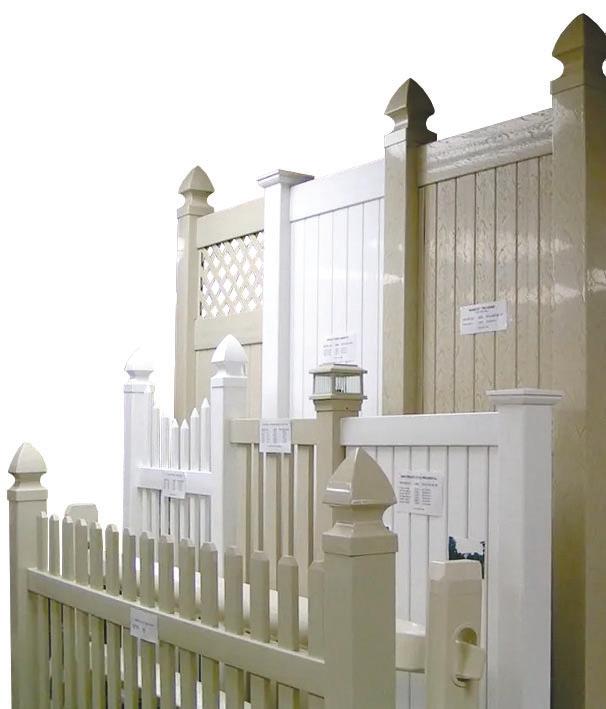

Find the Right Appliance Store
Appliances are major investments — big purchases meant to last for years. Because of their cost and importance, it’s smart to carefully choose where you buy them.
You may be drawn into a store by flashy ads or tempting sales on the latest models packed with new features. Or, you might simply need to replace an older appliance that’s no longer working. Either way, it’s important to know what you’re looking for, how much you’re willing to spend, and which retailers offer quality products at good prices.
You’ve likely done some homework already — maybe asked friends or relatives about their experiences. While the process can seem overwhelming, it can also be exciting.
Appliance companies now offer hightech options designed to simplify your daily life. Discovering what’s new in home appliances can be both informative and fun.
We’ve put together a few suggestions to help you find the right product and the best store for your needs. Start by deciding on your budget and what features are most important to you — what’s essential, what’s nice to have, and what you’re prepared to pay for.
Then it’s time to start shopping.
Research Local Options
Begin by looking online for appliance retailers nearby. Local stores are more convenient, and delivery is usually faster — a huge plus if your refrigerator or washer has suddenly stopped working. Many local shops also include free delivery within a certain radius.
Business review websites can show you what kind of service to expect. While negative reviews are worth reading, remember that satisfied customers don’t always post online.
Consumer Reports and the Better Business Bureau (BBB) are also helpful for checking a store’s reliability. A listing on the BBB site usually means the business meets basic standards for trustworthiness.
Most stores allow customers to leave feedback and ratings on both service and products. These reviews can give you a better idea of the store’s reputation and what to expect from their inventory.
Finding a store with experienced, helpful staff will make the buying process smoother and more pleasant.
Watch for Sales
Most shoppers want to get a great deal when buying an appliance. Look for ads in local newspapers or in your mailbox that highlight current appliance sales.
Some stores offer price matching to stay competitive. Not every retailer does this, so always ask beforehand. If you find a better price for the same model elsewhere, you may be able to get it at that lower cost.
Always research the appliance before you buy to ensure your money is well spent. Brands that were reliable in the past may not maintain the same quality today.
Understand Store Policies
Before you buy, review the store’s policies on warranties and repairs. If the appliance includes a oneyear warranty from the manufacturer, you may not need to buy extended coverage.
Appliances often follow seasonal sales trends. Washers and dryers are typically marked down in the winter, refrigerators in the spring, and ranges in the fall. If your purchase isn’t urgent, waiting for these seasonal deals can save you money.
Ask yourself a few key questions when picking a store: Do they offer delivery time slots? Are warranty and repair services available? Is there a broad selection?
Answering these questions will help you buy with confidence and peace of mind.
HOW-TO...
Begin Buying and Selling Coins
Collecting coins is a timehonored hobby that’s both enjoyable and enriching. For many, it eventually evolves into a business. Still, most collectors agree that the real reward lies in the thrill of discovery and the satisfaction of holding something old, rare, and beautiful.
People come into coin collecting in a variety of ways. Some inherit coins from family, giving them a jumpstart. Others might stumble upon an unusual coin in everyday change and become intrigued. Regardless of how they begin, collectors often find the hobby irresistible. Growing a collection takes time, effort, money, and knowledge.
While buying and selling coins can be exciting, it’s not always straightforward. A coin’s value depends on several factors—rarity, condition, and historical significance among them. Navigating the market can be tricky, and dealing with sellers or dealers may pose challenges. If you’re looking to start your collection, keep these tips in mind:
Identify What You Have Do your homework. Countless resources are
available to help you learn about coins. Understanding a coin’s background is crucial before you buy or sell. If you’ve inherited coins or received them as gifts, research their origins and potential worth. Visit coin shops—they often carry books to guide beginners. Libraries and the internet are also valuable sources of information. Once you’ve studied up, you’ll feel more confident in your buying and selling decisions.
Learn Coin Grading
Coin grading is a mustknow for collectors. This system rates coins based on their condition, which plays a major role in their value. Two coins may look the same, but grading scores can make a big difference in price. The bestpreserved coins— those with little to no wear—tend to be far more valuable than damaged or altered ones.
Avoid Cleaning Your Coins
Resist the urge to clean your coins. Beginners often think polishing will increase value, but it can do the opposite. Cleaning can remove a coin’s original surface, significantly lowering its
value. Collectors prefer coins in their untouched, original state.
Ask Questions
Frequently
Never hesitate to ask questions, even if they seem basic. It’s one of the best ways to learn. Seek out experienced collectors in your area—coin shops, clubs, and shows are good places to start. Ask them for advice, learn from their mistakes, and hear about their successes. Online sources can be hit or miss, so building relationships with trustworthy local experts is a safer path.





Visit Local Coin Shops Often
Make connections with your local coin shop. When dealers know what interests you, they can keep an eye out for coins you might want. Building a rapport with shop staff may even lead to lasting friendships. This handson approach can help you make smarter purchases, avoid scams, and deepen your enjoyment of the hobby.
As you become more knowledgeable, consider mentoring others. Sharing your experience helps grow the coin collecting community and keeps the passion alive for future generations.













Taxidermy is more than just preserving an animal — it’s about capturing a moment, a memory, or a onceinalifetime hunt. Whether it’s a prized deer, a cherished family pet, or a trophy fish, the quality of a mount can dramatically affect how that memory is preserved. Choosing the right taxidermist ensures your investment is treated with the care, detail, and respect it deserves. Here are key steps to guide your search:
1. Understand the Art of Taxidermy
Before selecting a taxidermist, it helps to familiarize yourself with the craft. Taxidermy involves complex processes that go beyond simple stuffing and sewing. Knowing the difference between highand lowquality work can help you identify skilled professionals. Visit local taxidermy shows, browse online galleries, and explore different pose options. Understanding how mounts are made helps manage expectations and encourages better communication with your taxidermist.
2. Research Services and Specialties
Not all taxidermists offer the same services. Some specialize in big game animals like bear, elk, or moose; others focus on small game, birds, fish, or even reptiles. If you’re looking to preserve a fox, duck, bass, or even a lizard, make sure the taxidermist you’re considering has experience






Choose a Taxidermist
in that area. Look through their website or social media for examples of previous work and a list of services.
A quality taxidermist will offer a range of mounting options—from full body and shoulder mounts to European and antler mounts—each tailored to your preferences.
3. Check Credentials and Legal Compliance
Depending on your state, taxidermists may be required to hold a license or pass a proficiency exam. Additionally, the U.S. Fish and Wildlife Service enforces federal laws that may affect your mount, especially if you’re transporting animals across state or international lines. Make sure your taxidermist operates within all legal regulations to avoid future complications.
4. Determine Your Budget
Pricing can vary widely depending on the animal, type of mount, and level of detail required. A large or exotic animal mount can cost several thousand dollars, while smaller mounts may be more affordable. Keep in mind that intricate poses or lifelike habitat displays will raise the cost. Though budget is important, prioritize quality over savings—you want a mount that will last a lifetime and look just as impressive decades later.
5. Ask the Right Questions
Once you’ve narrowed your options, reach out to potential taxidermists directly. Ask how long they’ve been in business, what species they work with most, and what their
typical turnaround times are. Be wary of taxidermists promising extremely fast results—quality work takes time. Some shops may take several months, especially during peak seasons.
6. Look at Reviews and Ask for References Online reviews can offer valuable insight into a taxidermist’s work ethic and customer service. Look for consistent comments about attention to detail, professionalism, and satisfaction with the final product. Don’t hesitate to ask for direct references or to speak with previous clients. A reputable taxidermist should be proud to stand behind their work and willing to share examples.
7. Choose Based on Quality and Fit
After gathering all the information, make your decision based on a balance of experience, style, and reputation. The best taxidermists aren’t just skilled artisans—they also treat each project with care and respect, preserving your memories as if they were their own. Many quality taxidermy shops, especially familyowned ones, bring a personal commitment to their work that sets them apart.
In the end, selecting the right taxidermist is about more than just price or proximity. It’s about trusting someone with your onceinalifetime moment— and ensuring it’s preserved beautifully for generations to come.
HOW-TO...
Choose a Window Treatment Store
Window treatments are far more than just decorative accents for your home’s windows. When thoughtfully selected, they add beauty and style while providing practical benefits that enhance your living environment. Beyond aesthetics, quality window treatments protect your furniture from fading caused by sunlight, improve your sleep by controlling light, and can even help reduce energy bills by insulating your home against heat and cold.
Window treatments come in a vast array of styles, colors, textures, and materials—ranging from simple shades and blinds to luxurious draperies and valances. This wide selection means there’s something to suit every décor style and
personal taste. While online shopping offers convenience, visiting a window treatment store in person allows you to see and touch samples, experience colors and textures firsthand, and get a clearer idea of how the treatments will look in your home’s lighting and space.
If you’re planning to shop for window treatments, here are several important factors to consider when choosing the right store:
Budget and Price Range
Window treatments vary widely in price. If you’re outfitting multiple windows, budget will be a key factor in your decisions. The best stores offer options across different price points—from economical, functional products to highend, durable pieces designed to last for

many years. Think about whether you want your window treatments to be a longterm investment or if you prefer to update your décor frequently with less expensive options.
Gather Inspiration and Ideas
Before visiting stores, gather decorating ideas from magazines, TV shows, websites, and social media. You may discover styles and color schemes that you love and that will work well in your home. Keep in mind that large prints and bright colors can dominate small spaces, so consider the size and scale of your windows and rooms carefully.
Sampling and Expert Guidance
When you visit a store, look through sample books that show fabric swatches, textures, and finished products. This tactile experience is invaluable for choosing materials that match your style and practical needs. Don’t hesitate to ask store staff for advice. Experienced employees can help you understand price ranges, maintenance requirements, and best fabrics for your environment.
Prioritize High-Use Areas
If your budget is limited, focus on rooms you and your family use most. You can select less expensive treatments for guest rooms or lessused spaces. This approach lets you allocate

your budget wisely without sacrificing style or function where it matters most.
Shape and Style
Considerations
Conventional window shapes — rectangular or square — usually cost less than customshaped treatments like trapezoids, triangles, or arches. However, unique shapes can make a strong design statement and may be worth the extra investment if they suit your home’s architecture and décor.
Quality Hardware and Durability
Window treatments don’t just rely on fabric and color; heavyduty hardware and mechanisms are essential for smooth operation and longevity. Especially in busy households, blinds or drapes may be opened and closed multiple times daily, so components need
to withstand frequent use, reducing the need for repairs and replacements.
Professional Installation Matters
Proper installation ensures your window treatments operate correctly and look their best. Certified installers have the skills and experience to fit treatments securely and handle any challenges. Many stores include installation services or recommend trusted professionals. This step is well worth the investment to avoid issues later.
The Advantage of Local Stores
Locally owned window treatment stores often provide personalized service compared to bigbox retailers. Their staff usually have specialized knowledge, helping you choose the right products and avoid costly mistakes. These stores may also offer design consul
tations or assist with room makeovers, helping coordinate window treatments with other home elements.
Trends and Timelessness
Window treatments come in countless fabrics, finishes, and features—like motorization, blackout linings, or energyefficient materials. A knowledgeable store can guide you toward options that fit current trends but also have timeless appeal, so your treatments won’t look outdated after a few years.
Do Your Research Don’t rush your decision. Take the time to research and visit multiple stores. Consider reviews, ask for recommendations, and compare product quality and pricing. Window treatments are an investment you’ll live with for many years, so choosing the right store and products is essential for longterm satisfaction.









Find the Right Bank
If it’s been a while since you last stepped foot in a bank, you’re not alone. As digital payments become more common, many of us now manage most — if not all — of our finances online.
Still, that doesn’t mean finding the right bank isn’t important. In fact, selecting a bank that aligns with your needs can lead to meaningful benefits, like better financial services, fewer fees, and more favorable rates. Even if you rarely visit a branch, a good banking relationship remains key to longterm financial wellness.
Today, the range of financial institutions competing for your money is larger than ever. Some people keep everything at one bank for simplicity, while others diversify — using different banks or credit unions for savings, credit cards, and investment accounts to get the best value from each.
Whether you go with a major bank, a local credit union, or a digitalonly option, the right fit depends on your habits, goals, and preferred way of managing your money. No matter the method, it pays to evaluate your options carefully.
Here are a few important factors to help you choose wisely:
Interest Rates
Banks compete aggressively by offering attractive interest rates — especially to new customers. Savings accounts, in particular, can vary significantly depending on the institution and broader economic conditions tied to the federal funds rate.
If you assume the interest rate isn’t a big deal, think again. Over time, even a small rate difference can make a noticeable impact on large balances. Take time to compare rates online and locally before deciding.
Fees
Bank fees can quickly eat into your balance. Some checking accounts limit the number of free transactions or require a minimum balance to avoid monthly charges.
Even accounts labeled “free” may come with hidden strings attached — like balance requirements or maintenance fees. Review each bank’s fee schedule thoroughly and ask questions so there are no surprises later.
Convenience
Having access to conveniently located branches and ATMs can make a real difference, especially if you travel frequently. Look for banks that belong to national ATM networks or reimburse outofnetwork ATM fees.
Also consider how userfriendly their online and mobile platforms are. A clean, secure banking app or website makes it easy to transfer funds, pay bills, and manage your finances anytime, anywhere.
Some banks go further with innovations like mobile branches — vehicles equipped to provide inperson service in areas without nearby branches.
Overdraft Protection
Mistakes happen. When your account dips below zero, how a bank handles overdrafts matters. Some offer lines of credit or charge a flat fee per overdraft. Others offer no protection at all.
Look for banks that notify you when your balance is low or an overdraft occurs — this can help you avoid recurring fees. Be sure to read each bank’s policy before opening an account.

Stability and Security
A bank’s financial strength is crucial. Before depositing your money, research the institution’s background and reputation. Strong banks are more likely to weather economic shifts and avoid risky investments.
Most banks are insured by the FDIC for up to $250,000 per customer, per account category — a vital safety net in case of failure.
Be sure you understand how that coverage works based on your account setup.
Even with federal insurance, bank failures are rare but not impossible. A wellcapitalized, conservative bank limits risky exposure and protects its customers’ funds.
Services Offered
Think about what banking services you use
most. Whether it’s loans, checking, mortgages, or investment help, your bank should offer what you need with minimal hassle and competitive terms. The goal is to find a trustworthy bank that provides convenience, value, and peace of mind. With a little research and comparison, you’ll be well on your way to a longlasting financial partnership that supports your goals.




HOW-TO...
Choose a Mattress
Let’s be honest: we spend a significant portion of our lives in bed. Getting quality sleep is crucial for both our physical and mental wellbeing. That’s why selecting a mattress that helps you sleep soundly and wake up refreshed is incredibly important.
Shopping for a mattress is no longer as straightforward as it once was. With innovations like memory foam, customizable comfort settings, and online retailers delivering straight to your door, the industry has rapidly evolved.
But don’t stress over the wide variety of options. Although the range of styles and prices might seem overwhelming, finding the right mattress for your preferences and budget doesn’t have to be complicated.
Start by asking friends and family for their suggestions, then begin your own research. Browsing online and checking local newspapers for sales can help you get a sense of what’s available and assist in narrowing down your options.
Think of your mattress as a longterm investment in your health and daily wellbeing. Higherpriced options might be worth exploring, especially during sales or clearance events. Quality mattresses generally hold
up better over time, sparing you from replacing them frequently or dealing with premature sagging.
Also consider your current bed size—maybe it’s time for an upgrade if you want more room to stretch out and relax.
Here are some important factors to think about:
Do you need firm or soft support? People with chronic pain or circulation issues might benefit from a firmer mattress to maintain spinal alignment. Others may prefer softer, bodyconforming options for better comfort.
Do you share your bed?
Memory foam can be a great choice since it molds to individual bodies and reduces motion transfer, keeping both sleepers undisturbed.
Are you sensitive to allergens? Standard materials like cotton or fiberfill may trigger allergic reactions. If so, consider latex, foam, or waterbased mattresses, and look into hypoallergenic covers to reduce exposure to dust mites or lint.
As you explore different mattress types, here are some common styles to consider:
Pillow-top mattresses are known for their plush feel. They still come in varying firmness levels, but the added layer increases
their thickness, which may require larger fitted sheets.
Innerspring or coil mattresses provide strong support, ideal for people who need to keep their spine aligned. Stores usually have many samples to test—buy the best you can afford.
Memory foam or latex mattresses contour to your body, making them a smart choice for those with joint, muscle, or circulatory issues. They help relieve pressure points and provide even support.
Adjustable air mattresses let each sleeper control firmness through air chamber settings. Perfect for couples with different comfort needs, these beds can also adapt to your changing physical condition.
Don’t be shy when testing mattresses instore. Lie down, roll around, and notice how your body reacts. Does it feel supportive and comfortable?
Make sure to ask about warranties or return policies. Most quality mattresses come with a 10year warranty. If it’s significantly shorter — or absent — it’s wise to look elsewhere.
Remember, buying the right mattress is a commitment to better sleep and a better life. Choose carefully, and you’ll enjoy years of deep rest and energized mornings.

INVEST IN YOUR REST?
used to – it might be time for a change.






Select a Dentist
Choosing the right dentist is an important step in maintaining your overall health and wellbeing.
Regular dental checkups not only protect your smile, but also play a key role in detecting early signs of other health issues. Whether you’ve just moved, haven’t been to a dentist in a while, or are looking for a better experience, here’s how to find a dental practice that’s the right fit for you.



Prioritize Comfort and Convenience
A great dentist’s office goes beyond cleanings and procedures—it should make you feel welcome, comfortable, and cared for from the moment you walk in the door. Look for practices that prioritize patient comfort with amenities like relaxing waiting areas, entertainment options during treatment, and even small touches like blankets, pillows, or warm towels that can ease anxiety and make appointments more pleasant.
Office hours and location are also key. Life is busy, so seek a dentist who offers early morning, evening, or even sameday emergency appointments. Practices that respect your time and aim to keep appointments running on schedule show they value your experience.
Look for a PatientFocused Approach
Your dental care should never feel rushed or impersonal. A highquality dental office will take the
time to get to know you and your oral health history, explain treatment options clearly, and answer all of your questions. During your initial appointment, you should expect a thorough exam that may include digital Xrays and gum evaluations, followed by a personal consultation to discuss findings and treatment recommendations.
The right dentist won’t pressure you into unnecessary procedures or leave you in the dark about what’s being done. Transparency and communication are essential.
Evaluate Services Offered
While general cleanings and exams are a given, many dental offices also offer a range of cosmetic and restorative services. These might include Invisalign, teeth whitening, veneers, dentures, or dental implants. Choosing a dentist with a wide scope of services can save you time and ensure continuity of care, especially if you need more advanced treatment in the future.
Additionally, ask whether the practice uses modern technology and uptodate techniques. Dentists who pursue ongoing education and stay informed about the latest advancements are more likely to deliver highquality care.
Understand
Payment and Insurance Options
Dental care should be accessible and affordable. Confirm that the practice
accepts your dental insurance and check whether they provide accurate treatment estimates ahead of time. If you don’t have insurance, look for flexible payment plans or financing options.
A reputable office will work with you to find a financial arrangement that supports your oral health without surprises.
Consider the Little Extras Some dental offices go the extra mile with added conveniences like free WiFi, children’s play areas, complimentary refreshments, and familyfriendly entertainment. These touches may seem small, but they can make visits less stressful— especially for children or patients with dental anxiety.
Ask Around and Read Reviews
Word of mouth is still one of the best ways to find a great dentist. Ask friends, family, and coworkers for recommendations. Check your local newspaper for dentists that are accepting new clients. Online reviews can also provide insight into patient satisfaction, office cleanliness, staff friendliness, and wait times. In summary, finding the right dentist isn’t just about clinical skill—it’s about trust, comfort, and personalized care. A professional and friendly dental team can help you maintain a healthy smile for years to come. With the right practice, going to the dentist might even become something you look forward to.
HOW-TO...
Begin a Career in Cosmetology
Cosmetology offers those with a creative passion for makeup, styling and a vibrant atmosphere interacting with others who share your desire to make people look their best a path to a rewarding career in salons or even selfemployment.
Besides making people look their best — a reward in itself — you’ll encounter a vibrant atmosphere with coworkers who can help add to your skills and talents to keep you on top of all the trends.
Before you head down to the local salon and ask for a job, you’ll need to learn the requirements for becoming a licensed cosmetologist in your state.
Here’s what you need to know:
State Requirements
The legal requirements you must meet before you can work as a professional cosmetologist vary from state to state.
Some areas of the country have strict rules and training requirements, so it is important to have a clear understanding before you commit to pursuing this career.
It is likely you will have to attend some mandatory training in a cosmetology school, and then pass an exam to get a license. You will have to prove that you can help your customers and meet all of the legal requirements.
It’s also important to consider other programs such as Esthetics and Nail Technology; a cosmetologist can perform all of these services, but if you are interested in only those fields, a “Limited License” may be more appropriate.
A Good School
The training you receive will affect your career, so pick a good school.
The best cosmetology schools have a reputation for preparing their students for the job market. Meeting the requirements set by the government is really just a bare minimum.
After all, you want to succeed at your new career. You will have to learn how to provide the best customer service, communication skills and how to work well with others.
Look for a school with a training environment that replicates what you
will expect to find in the real world. This includes dealing with customers that ask for popular hairstyles and beauty treatments.
Also, ask about career placement services and financial aid.
A Long-Term Plan
Like other careers, cosmetologists generally start at an entrylevel job and work up to more responsibility and better paying positions.
You might also choose the path of an entrepreneur. The most financially successful people in the field are also smart business people and decide to start their own independent business.
Take a look at your path and where you want to be 10, 15 or even 20 years into your career.
But it all starts with finding your passion. If cosmetology seems like a good fit for your personality and interests, then visit your local cosmetology school to see what it will take to get started on your new career. Make sure you keep uptodate on all of the newest hairstyles, makeup and other fashion trends.

























Find the Right Attorney
Although there are reputable online platforms that may help individuals handle certain legal matters without a lawyer, most people will benefit from meeting with professional legal counsel in their home town.
Unfortunately, many people begin searching for an attorney during times of stress or crisis, which can lead to rushed decisions and poor outcomes. No matter your legal situation, it’s wise to find a local competent and trustworthy lawyer before a problem arises.
The attorney you choose can significantly impact the quality of the legal work that is performed—whether it’s preparing an appropriate Will and Power of Attorney, protecting your finances in a divorce, or safeguarding your interests in a business transaction. Representing yourself or using an online legal service may seem like a way to save money, but it can backfire. Attorneys bring legal expertise, negotiation skills, and knowledge of procedures and paperwork that most people simply don’t have.
Here are key considerations when selecting legal representation:
Cost and Value
Going with the cheapest option isn’t always the best idea. When it comes to legal representation, quality and experience matters.
The saying “you get what you pay for” often holds true. A less expensive but inexperienced lawyer might
take longer to resolve your issue—potentially costing more in the long run.
Avoid hiring any attorney who has been disbarred, and be cautious with those who’ve received disciplinary action from the bar association.
Legal Experience
Make sure the attorney you hire is experienced in the specific area of law you need. For example, a family law case requires a lawyer with experience in handling divorces and custody issues, while estate matters are best handled by estate planning attorneys.
Some lawyers work across multiple legal areas, but it’s crucial to select someone who regularly handles cases like yours.
Finding a Lawyer
A great way to find a reliable attorney is through recommendations. Ask family, friends, or colleagues who’ve had a positive legal experience, especially if they’ve faced similar situations.
Also, review a lawyer’s website to get background information on the law firm and the legal matters it handles.
Understanding Fees
Lawyers typically bill by the hour. In personal injury cases, they may take a percentage of any financial recovery. For estate matters, some charge based on estate value, while others bill hourly. Be cautious about estate lawyers that charge
based on estate value. Often times, it is less expensive to be charged on actual time spent.
This distinction is important. If you’re dealing with a large estate, an hourly billing model might save you thousands compared to a percentagebased fee.
Online Reviews and Ratings
There are several sites where you can read client reviews and lawyer ratings. These can offer useful insights but should be taken with caution—reviews are often subjective. Focus on feedback about professionalism, communication, and outcomes rather than emotional rants. Although there may be a negative review or two, look at the overall number of reviews as some negative reviews may be unjustified.
Initial Consultation
Meeting with a lawyer for an initial consultation can help you gauge whether they’re a good fit. It’s your chance to assess their experience, communication style, and transparency about fees and billing practices.
Ask plenty of questions and expect clear, honest answers. If something feels off, keep looking. You should only hire an attorney when you’re confident in their skills and comfortable with their approach.
There are many capable lawyers out there. Taking the time to find the right one can make all the difference in your legal matter.
HOW-TO...
Choose a Financial Advisor
Navigating your finances and investments to achieve both shortterm gains and longterm stability can feel overwhelming. In Lancaster County, Pennsylvania, where prudent financial management is highly valued, finding the right financial advisor can make a significant difference.
Financial advisors offer expertise and an objective viewpoint to navigate through the complexities of financial planning. They help optimize savings, investments, and expenditures, while also exploring innovative financial strategies you might not have considered. Especially during uncertain economic times, they play a crucial role in managing taxes and guiding you towards financial security.
To find a trustworthy financial advisor in Lancaster County, start by seeking recommendations from your local community—friends, family, and colleagues can provide valuable insights. Additionally, check local newspapers or online resources for listings and advertisements.
Once you have a shortlist of potential advisors, prioritize those who are certified financial planners (CFPs). CFPs have undergone rigorous training and exams, ensuring they have the qualifications to provide sound financial advice. It’s essential to verify their credentials and check for any disciplinary history with relevant certifying organizations.
Consider the advisor’s specialization and expertise. Whether you’re interested in bonds, mutual funds, stocks, or commodities, finding an advisor with experience in your preferred investment area can be advantageous. Look for someone who can tailor investment strategies to fit your unique financial goals and risk tolerance.
Evaluate the advisor’s track record of success. Assess their historical performance—have they consistently outperformed the market? It’s crucial to understand how they’ve navigated past economic downturns and how their clients have fared during challenging times. Be cautious of overly impressive success rates, as they could indicate unrealistic
promises or highrisk strategies.
Understand how the advisor is compensated. Some advisors work on a commission basis, potentially leading to conflicts of interest if they recommend products based on commissions rather than your best interests. Feebased advisors, on the other hand, charge fees for their services, aligning their incentives with your financial goals.
Finally, conduct interviews with your top choices. This is an opportunity to discuss your financial objectives openly and gauge how well the advisor understands and supports your goals. A reliable financial advisor should prioritize educating and empowering you to make informed financial decisions.
Choosing the right financial advisor in Lancaster County involves careful consideration of their qualifications, expertise, track record, and alignment with your financial goals. By taking these steps, you can find a trusted partner to navigate your financial journey effectively.



Solutions for Your Financial Concerns

Michael N. Zimmerman, M.Sc. CEPA


Select the Best Retirement Community for Your Needs
Americans are living longer than ever before, and with more baby boomers turning 65 each day, the demand for retirement communities has surged. These communities have evolved significantly in recent years to meet the changing expectations of today’s seniors.
Modern retirement communities focus on lifestyle just as much as care. Gone are the days when they revolved solely around golf and tennis. Today, some are themed or even celebrityendorsed— like those inspired by Jimmy Buffett’s carefree “Margaritaville” spirit—bringing a sense of fun and personality to retirement living.
Of course, practical factors still matter. You may need access to assisted living services or ongoing medical care. But wanting to live in a peaceful environment surrounded by peers is a perfectly valid reason to consider a retirement community. After all, most people want a neighborhood where they feel comfortable and supported— something retirees deserve just as much as anyone else.
If you’re planning a move or simply exploring your options, here are a few key aspects to keep in mind: Amenities, Activities, and Parking
Many retirees enjoy staying active, and any community you’re considering should provide easy access to fitnessfriendly options like walking trails, golf, swimming, or tennis. Others may prefer creative outlets like painting, crafts, or participating in game nights and social gatherings.
Taking part in community events is a great way to form friendships and stay socially engaged. Ask what regular activities or excursions are offered, whether to museums, theaters, or shopping centers.
Don’t overlook parking. It may seem minor, but insufficient parking can discourage friends and family from visiting. Adequate guest parking is essential for staying connected with loved ones.
Health Services and Emergency Planning
Accessibility to quality healthcare is another vital consideration. Choose a location that’s close to medical providers you trust—hospitals, clinics, and emergency services should be within reach.
Additionally, the community itself should have safety measures in place. Ask about emergency response plans and whether units include features such as handrails, emergency call systems, or stepfree entrances to ensure resident safety and independence.
Pet-Friendly Policies
If you have a beloved pet, be sure to check the community’s policy on animals. While some allow pets, others have restrictions, so this could be a dealbreaker.
Many retirement communities now welcome pets and recognize their emotional and physical health benefits. Nearby green spaces or walking trails can make it easier for both you and your pet to get regular exercise and fresh air—something that contributes to overall wellbeing.
Local Services and Environment
Think about the location’s surroundings. Proximity to schools, sports complexes, or busy roadways may bring noise and traffic that some retirees prefer to avoid. Look for communities in quieter, less congested areas if peace and relaxation are priorities. Also, check whether libraries, places of worship, or community centers are nearby. Public transit access can also be important. Many communities now offer private transportation options for residents, which can be invaluable for those who no longer drive but still want the freedom to shop or attend appointments.
Resident Feedback and Community Vibe
Talking to current residents can provide valuable insight into what life in the community is really like. Ask about their experiences and impressions of the staff, facilities, and overall atmosphere.
Choosing a retirement community is a deeply personal decision. You want to be confident that it aligns with your lifestyle and supports your needs.
By taking the time to visit multiple locations, ask questions, and weigh your priorities, you’ll be more likely to find a place where you can thrive. A welcoming, wellmatched retirement community offers the chance to build friendships, enjoy new experiences, and
this
to
HOW-TO...
When you’re in need of heating or cooling system repairs or replacements, selecting the right HVAC contractor is the most crucial — yet potentially overwhelming — part of the process.
Choosing an experienced and reputable provider ensures your system is installed or repaired for maximum efficiency and reliability. In contrast, hiring an unqualified technician could lead to mistakes in sizing, measurements, or system design.
A poorly installed HVAC system can result in higher energy bills, reduced comfort, and a shorter system lifespan.
Since HVAC systems are a significant investment, it’s essential to research carefully before hiring a provider. Here are some key tips to help you choose the best HVAC contractor:
Check References
Before selecting a contractor, review local advertisements and search review platforms such as Google and Facebook. A reputable company should have positive feedback and a solid history of satisfied customers. You can also ask family, friends, or
neighbors for referrals based on their experiences. It’s wise to consider companies with years of industry experience. A contractor known for both quality work and strong customer service will make the experience much more manageable.
Verify Certifications
Make sure the technicians are licensed, insured, and have passed background checks. Verifying these credentials is a quick but vital step in confirming the company meets industry standards. HVAC contractors typically include their license number in ads or on their website. Confirming the company hires skilled, vetted professionals protects both your home and your peace of mind.
Request Written Estimates
A trustworthy HVAC company will provide a written quote before any work begins. They should also take the time to explain all charges and fees upfront. Having a clear understanding of costs prevents surprises later. Review the estimate closely and don’t hesitate to ask questions before committing.
Getting quotes from multiple companies is also smart. Compare not just price, but also reputation. Choosing the cheapest bid from a poorly rated contractor may save money now but cost more in the future due to subpar work.
Lowering Costs
To help control expenses, look for companies that offer free estimates. Because HVAC systems — especially replacements — can be costly, energy efficiency should also be a factor in your decision. Efficient systems reduce longterm utility bills. An experienced contractor can help you understand warranty options as well, allowing you to make an informed, costeffective choice for your property.
On-Site Evaluations
The contractor should visit your home before beginning any replacement work. A proper inspection allows them to take measurements, examine your current system, and give informed recommendations on whether repair or replacement is best. A reliable HVAC provider will take time to thoroughly assess your home’s needs before the project starts.


Look no further than John Weidman & Sons for the most dependable heating and cooling sales and service. We are a family-owned and operated company that began over 80 years ago as an old-fashioned coal delivery business, before transitioning from coal to oil. We now install and service virtually any type of heating and cooling system.


























Serving the Professional and the Homeowner
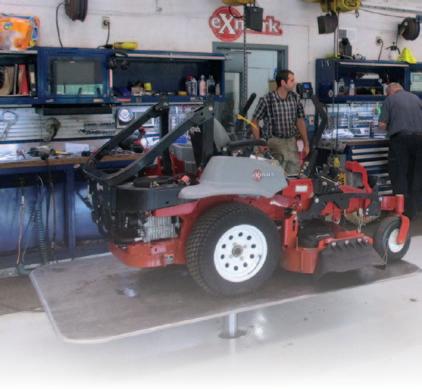






















Choose a Lawn Mower Repair Company
Lawn mower upkeep and repairs are often neglected until an urgent need arises. You might grab your mower to tackle an overgrown lawn, only to find it won’t start. While minor fixes can sometimes be handled on your own, attempting repairs without proper knowledge may cause further damage. Depending on your mower’s age and condition, replacing it might seem like the simplest solution. However, by following some advice, you can find a lawn mower repair company that meets your needs — providing quick, affordable, and trustworthy service.
Timing Is Key
Repair shops vary in how busy they get, so if you require your mower fixed promptly, communicate this upfront. Many repair businesses experience peak demand during spring when most people start lawn care, which can lead to long wait times. It’s not uncommon for your mower to sit for weeks before being serviced during busy periods. To avoid this backlog, test your mower regularly before the cutting season begins. Catching problems early allows you to schedule repairs ahead of the rush, ensuring quicker service.
Understanding Pricing With rising costs across many products and services, repairing your mower often makes more financial sense than buying a new one. Most companies offer
free estimates, but inquire about diagnostic or service fees to avoid surprises. Repair complexity depends on mower type — riding mowers usually require more specialized work. Some shops handle repairs onsite; others send mowers offsite. Offsite repairs tend to cost more due to transportation.
If keeping costs down is your priority, ask about hourly labor rates and extra charges. Review your mower’s warranty, as it may cover certain repairs, making fixing your mower more economical than replacement.
Services Offered and
Technician Qualifications
Check what services the repair company provides. Some specialize in tuneups and blade sharpening; others handle engine or transmission repairs. Ensure they can service your mower model. Ask about technician qualifications — certified mechanics diagnose and fix problems correctly the first time.
Reputable shops often guarantee their work, offering peace of mind if issues arise after repair. Also, ask if they use genuine manufacturer parts versus generic ones, as originals usually last longer and perform better.
Customer Experiences and Reputation
A reliable way to assess a lawn mower repair company is by hearing about the



experiences of other customers you know or from wordofmouth recommendations. Personal stories from friends, family, or neighbors who have used the company can provide valuable insights into the quality of service, reliability, and pricing. Positive firsthand accounts often indicate a trustworthy business that delivers satisfactory results. Don’t hesitate to seek out a reputable company in your local newspaper and ask around in your local community or gardening groups to find repair shops with a solid reputation based on real customer experiences.
Location and
Convenience
Consider the shop’s location. A nearby service center makes dropoff and pickup easier, especially for bulky riding mowers. Some companies offer mobile repair services, coming to your property to fix issues — convenient but possibly pricier.
In Summary
Choosing the right lawn mower repair company involves balancing timing, pricing, services, technician expertise, and reputation. Plan ahead, check warranties, ask questions, and research companies to find a service that restores your mower efficiently and affordably. With the right approach, you can extend your mower’s life and keep your lawn looking great season after season.
HOW-TO...
Find the Right Veterinarian
Many people consider their pets to be a part of the family, and therefore want only the best when it comes to their care.
Just like their owners, pets are vulnerable to the effects of disease and aging. They require the training of a veterinarian who specializes in preventative medicine as well as addressing any health conditions that may arise along the way. Yearly veterinary visits and preventative care will help your pet live a long and happy life.
Choosing a good veterinarian that suits you and your pet can seem like a difficult task. Whether you are searching for a provider for a new pet, or looking to change practices for an existing one, by utilizing the following guidelines, you should be able to find a professional that will give your pet the best care possible.
Do Your Research
Your family and friends may be able to suggest a good veterinarian. Listen to their experiences and ask specific questions regarding the doctor or
doctors they recommend, determining if they would be a good fit for you and your pet.
Look for advertisements in local newspapers, or do a search online for local veterinary offices. Review the websites of the practices you find. Many will list the types of services they offer, as well as information about their veterinarians and other team members. Each doctor within a practice may offer different specializations. Some hospitals offer extended services, including specialty medicine, holistic or alternative medicine, grooming, boarding, daycare and physical therapy. Practices may also offer convenience features such as online appointment scheduling or payment plans.
Consider the office’s location and hours, as well as the size and scope of the practice. Some larger veterinary practices may be linked to national pet care chains, or may have multiple offices to choose from. Smaller, local practices may offer a more personalized experience.
Give Them a Call
After making a list of your top choices, give the offices a call. The staff should have the time to answer many of your questions. They can discuss with you in more detail the services they offer and answer specific questions regarding your pet’s needs. Some hospitals will offer tours. Do not expect this of all facilities; the veterinary clinic is a busy place! However, you should be able to get a good feel for the facility through talking with their client care team. Finding the best vet for you and your pet will take time and research. It is best to have a veterinarian lined up before an emergency situation arises. Trying to choose a practice quickly if your pet is sick or injured can be stressful. The bottom line is that your pet’s health is a cooperative undertaking between you and your veterinarian. Each pet and family has different needs. Finding the perfect veterinarian for you and your furry, scaly or feathered friend will ensure they will be with you for years to come.




DR. DOYI BAE
At Peaceable Kingdom Animal Hospital, we are pleased to have a large amount of veterinary services available for our patients. We are proud to be able to serve Ephrata and our surrounding communities to give your pet the best care that they deserve.


Choose An Auctioneer
If you’re looking to sell valuable property, antiques, a personal collection, or even real estate, an auction can be one of the most effective methods to generate interest and achieve strong results. Auctions are a timetested sales method that continue to thrive in today’s digital world, thanks to the energy they create and the competitive spirit they inspire.



Each year in the United States, over a quartertrillion dollars’ worth of goods and services are sold through auctions. The auction format generates excitement and urgency— motivating buyers to act quickly and bid competitively. The fastpaced rhythm of a professional auctioneer’s chant, coupled with targeted advertising, draws motivated, readytobuy audiences.
When selecting an auctioneer or auction company, it’s important to choose someone who works in the industry fulltime. A fulltime auctioneer brings a higher level of responsiveness and commitment. They are more likely to respond promptly to inquiries from potential buyers—building confidence and trust, which can translate into stronger bids and better final sale prices. Experience is also a key factor. An auctioneer with years of practice understands the many variables that contribute to a suc
cessful auction: how to market your assets, where and when to advertise, which keywords will attract the right audience, and how to stage the event for maximum visibility. It’s worth noting that more than 90% of a successful auctioneer’s work takes place before the auction day itself. From initial consultations and inventory assessments to marketing campaigns and buyer outreach, the preparation is both strategic and laborintensive.
Great auctioneers are more than just fast talkers— they are skilled marketers, professional communicators, and logistical planners. Their job is to build an advertising and promotional strategy that generates interest and drives bidders to your sale. An experienced auctioneer blends showmanship with business sense to ensure your auction is not only engaging but also profitable.
To find a reputable auctioneer, start by checking local newspapers or researching online. Many newspapers have dedicated auction sections in their classifieds. Look for professionals who are members of recognized organizations such as the National Auctioneers Association or the Pennsylvania Auctioneers Association. These associations promote high ethical standards and ongoing education, helping ensure
that their members remain up to date with industry best practices.
Before hiring anyone, ask about their background and areas of specialty. Some auctioneers focus on real estate, while others are known for handling estate sales, fine art, or agricultural equipment. Request references and follow up with past clients to hear about their experiences. You should also consider attending one of the auctioneer’s events. Watching them in action will give you a firsthand sense of how they manage a crowd, interact with bidders, maintain momentum, and communicate key details.
Keep in mind that every auction is unique. A professional auctioneer will take the time to understand your specific goals, assess the items to be sold, and tailor the approach accordingly. Once you’ve selected the right person, you can rest assured knowing your sale will be professionally managed and strategically promoted to achieve the best possible outcome.
Whether you’re clearing out a collection, settling an estate, or selling highvalue assets, choosing the right auctioneer can make all the difference. With the right professional guiding the process, you’ll not only simplify the experience— you’ll maximize your results.
HOW-TO...
Choose a Furniture Store
Just because assembling furniture is doable doesn’t mean it’s always the best option.
While massproduced desks or shelves from large chain stores might be fine for a home office, your main living spaces — where you dine, unwind, and host guests — deserve durable, wellconstructed furniture made from highquality materials and fabrics built to endure.
Choosing furniture for your home starts with selecting the right store. Browsing online can offer inspiration, but there’s no substitute for physically seeing, touching, and imagining a piece in your space.
Since not every store will match your taste, needs, or budget, the process can feel overwhelming. But it also offers a chance to explore your style and enjoy the hunt.
Here’s what to keep in mind when looking for a great furniture store:
Durability and
Craftsmanship
Find a store that offers furniture built to last.
While inexpensive décor can be updated regularly,
key items like dining tables and sofas should be purchased with longevity in mind. That means prioritizing strong construction over trendy looks.
Sturdiness isn’t always obvious at first glance — the piece should feel stable, not delicate. Try to learn about what it’s made of, how it’s constructed, and whether a warranty is included.
Knowledgeable staff should be able to explain how and why the furniture is built a certain way. The best stores have salespeople who act as advisors, not aggressive sellers.
Focus on
Long-Term Value
Spending more upfront on a quality piece often saves money in the long run.
For major purchases, such as couches or beds, it’s wise to focus on value rather than just the price tag.
A cheap sofa made from poor materials won’t hold up, and an overpriced piece isn’t worth it if it lacks solid structure. Seek out reputable brands with strong track records and solid customer reviews.
Customer Service and Delivery Options
Service policies vary widely from store to store. Choose a place known for treating its customers well.
Ask about return and exchange options. Some stores let you return or trade in items within a set time frame, though fees may apply. Make sure you understand the return process before committing to a purchase.
Also, clarify delivery details — costs, delivery zones, timelines, and setup.
When comparing stores, factor in delivery charges. A lowcost item may not be a better deal if delivery is expensive. Sometimes, paying a bit more for a piece with free or discounted delivery makes better financial sense.
Final Thoughts
At the end of the day, two things truly matter: the quality of the furniture you buy and the customer service you receive.
When you find both in a store, shopping for furniture can be enjoyable — and it can lead to beautiful, lasting additions to your home that you and your family will appreciate for years to come.


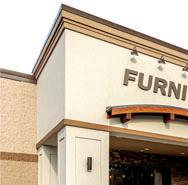





















Select the Best Cuts of Meat








As the old ad campaign once said, “Beef — it’s what’s for dinner.” And for many people in the U.S., that still holds true. We enjoy meat, and even more so when it’s a highquality cut. A premium piece of meat can elevate any meal and truly enhance its flavor. When you browse the meat section at your grocery store, you might easily recognize basic options like ground beef or wellknown steak cuts. While labels are provided, they don’t really guide you toward choosing the best quality cuts.
flavor if not cooked quickly. Steaks like Tbone and Porterhouse are best seared over high, direct heat for a short duration to retain their flavor and tenderness.
2. Pay attention to texture and fat distribution.
Beginners might want to practice on less expensive cuts like sirloin. As your grilling skills improve, you can move up to premium steaks like New York strip, filet mignon, Tbone, or Porterhouse.
It can be difficult to judge the toughness or softness of meat at a glance, but the cut often gives clues. Different parts of the animal produce meat with varying tenderness.
In the end, it’s the combination of cooking technique and quality meat that makes a meal exceptional.
Talk to Your Local Butcher



If you don’t have a butcher nearby to offer guidance, the following tips can help you make better meat selections:
1. Pick the right cut for your cooking method.


Think about how you plan to prepare the meat and the final texture you’re aiming for. Traditional barbecue, for example, uses tougher, more affordable cuts that benefit from long, slow cooking to become tender. Brisket, for instance, will be dry and chewy if cooked quickly over high heat, but turns moist and tender when smoked at a low temperature for several hours.
Some meats, however, become tough and lose
Look at the marbling — the small veins of fat within the meat. These can be a good indicator of flavor potential. Many meat lovers associate marbling with rich taste.
Still, not all marbling is equal. Thick chunks of fat don’t render easily during cooking and are best suited for slow roasting or braising. Finer, welldistributed streaks of fat are ideal for highheat cooking like grilling or pansearing.
3. Check the color and be wary of artificial color preservation.
Fresh meat exposed to air will turn brown quickly. So if the meat is still a bright red color and no chemicals like carbon monoxide have been used to keep it that way, you’re likely looking at a very fresh cut.
Shopping for meat can be much easier when you consult with a knowledgeable butcher. Ask about how and where the animals were raised and what standards they use for meat handling and storage. They can also suggest the best way to cook a certain cut or explain how to properly store it until you’re ready to use it.
There’s no shame in not knowing much about meat. After all, a butcher might not know how to fix a car or program a computer. But when it comes to meat, they are the experts — and that’s exactly who you should turn to for guidance. A good butcher will understand your needs and will be more than happy to help you choose the best meat for your meal.
HOW-TO...
Choose A Metal Roof
Metal roofing stands out for its adaptability, superior protection, and wide range of choices. Few materials can compete with the durability and longterm benefits that metal roofs provide.
Though the upfront investment may be higher than that of traditional roofing options, a wellinstalled standing seam metal roof can offer reliable performance for many years. Over time, the minimal maintenance and extended lifespan often make metal roofing the more costeffective choice.
Here are key points to keep in mind when selecting metal roofing:
Design and Appearance
Metal roofs were once thought of as basic, shiny sheets of tin. However, today’s metal roofing comes in a broad selection of styles and colors. You’ll find everything from bold matte finishes to textured patterns, available in nearly any shade you want— including classic silver.
The goal is to match both function and style. Choose a design that complements your building’s architecture. Online visualization tools can show
how different roof styles will look on your home or commercial space. Narrow your choices to a few finishes and request samples to compare them against your exterior materials.
Top roofing providers often offer design consultations to help bring your vision to life and ensure aesthetic and structural compatibility.
Types of Metal
Metal roofing is available in several types, such as aluminum, steel, zinc, copper, and various alloys. These materials vary in durability, resistance, and ideal climates. They also come in different gauges and finishes.
Some panels are prepainted and shaped at the factory, while others require more work onsite. In regions with extreme weather, thicker gauges and corrosionresistant finishes may offer better protection.
Seek guidance from a reputable local business. Companies with experience in your region will know which materials are best suited for local conditions. Choose a provider known for quality service and customer satisfaction.
Warranty Coverage
Before buying, review the warranty carefully. Know exactly what is included— whether it covers just materials, or labor as well. The best warranties offer longterm protection and peace of mind.
Ask for clear details on any potential costs not covered, and choose a company that stands by its product. A strong warranty is a good indicator of product confidence and quality manufacturing.
Energy Efficiency
A wellinstalled metal roof can reduce your energy bills. Compare different materials and styles to determine which offer the best energysaving features.
Some metal roofs include insulation layers and reflective coatings to reduce heat absorption. These features help regulate your attic’s temperature yearround, boosting energy efficiency and indoor comfort.
Additionally, some metal roofing systems are eligible for tax credits or incentives, depending on your location and the product’s energy performance rating.

Support Local Businesses
While chain retailers may stock metal roofing, local suppliers often provide more personalized service and expertise. Whether you’re
buying for a home, business, or farm, local companies usually have knowledgeable staff who can help you find the right product—and even connect you with trusted local roofers.
Choosing a local business also supports your regional economy and helps ensure reliable customer service both during and after installation.

